EX-3.2
Published on February 22, 2023
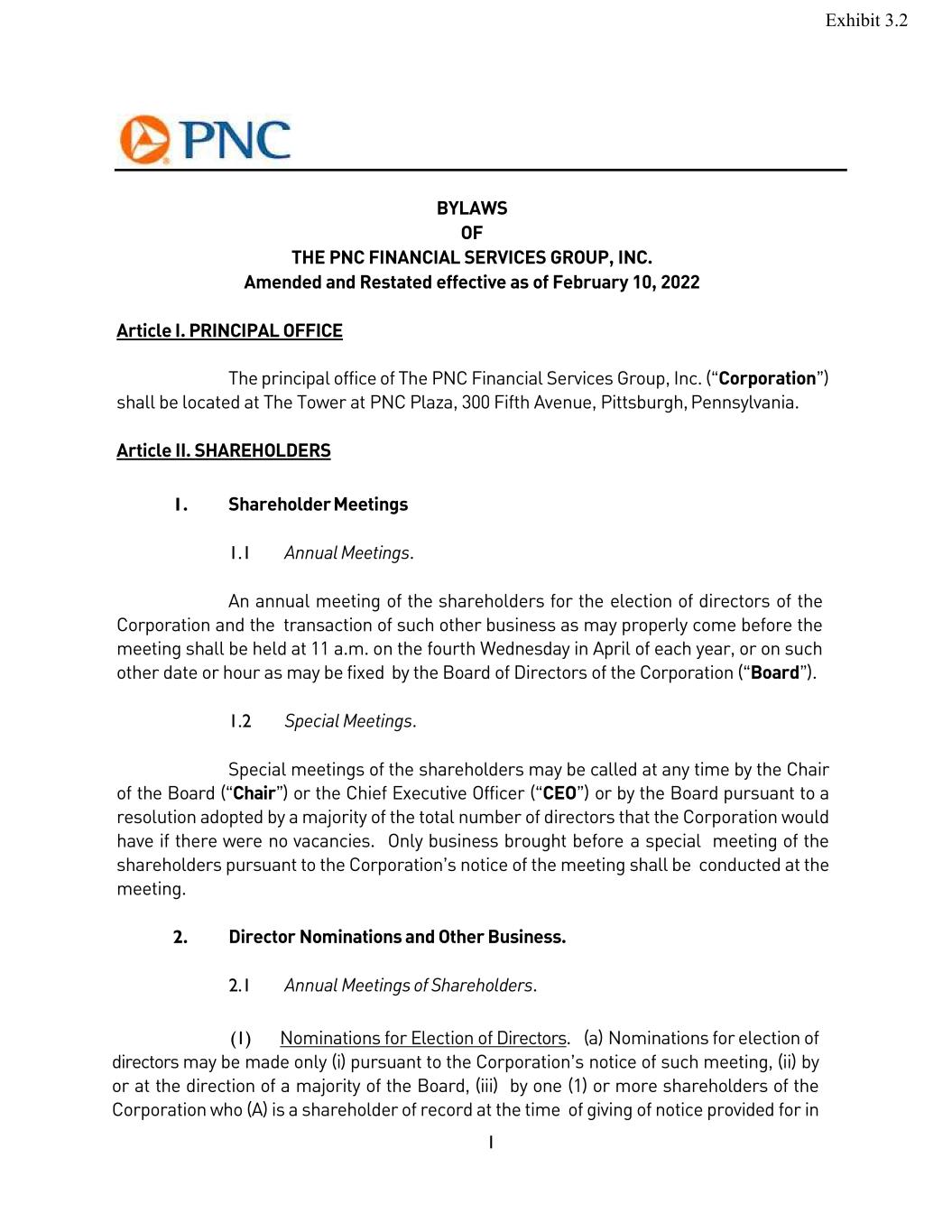
1 BYLAWS OF THE PNC FINANCIAL SERVICES GROUP, INC. Amended and Restated effective as of February 10, 2022 Article I. PRINCIPAL OFFICE The principal office of The PNC Financial Services Group, Inc. (“Corporation”) shall be located at The Tower at PNC Plaza, 300 Fifth Avenue, Pittsburgh, Pennsylvania. Article II. SHAREHOLDERS 1. Shareholder Meetings 1.1 Annual Meetings. An annual meeting of the shareholders for the election of directors of the Corporation and the transaction of such other business as may properly come before the meeting shall be held at 11 a.m. on the fourth Wednesday in April of each year, or on such other date or hour as may be fixed by the Board of Directors of the Corporation (“Board”). 1.2 Special Meetings. Special meetings of the shareholders may be called at any time by the Chair of the Board (“Chair”) or the Chief Executive Officer (“CEO”) or by the Board pursuant to a resolution adopted by a majority of the total number of directors that the Corporation would have if there were no vacancies. Only business brought before a special meeting of the shareholders pursuant to the Corporation’s notice of the meeting shall be conducted at the meeting. 2. Director Nominations and Other Business. 2.1 Annual Meetings of Shareholders. (1) Nominations for Election of Directors. (a) Nominations for election of directors may be made only (i) pursuant to the Corporation’s notice of such meeting, (ii) by or at the direction of a majority of the Board, (iii) by one (1) or more shareholders of the Corporation who (A) is a shareholder of record at the time of giving of notice provided for in Exhibit 3.2
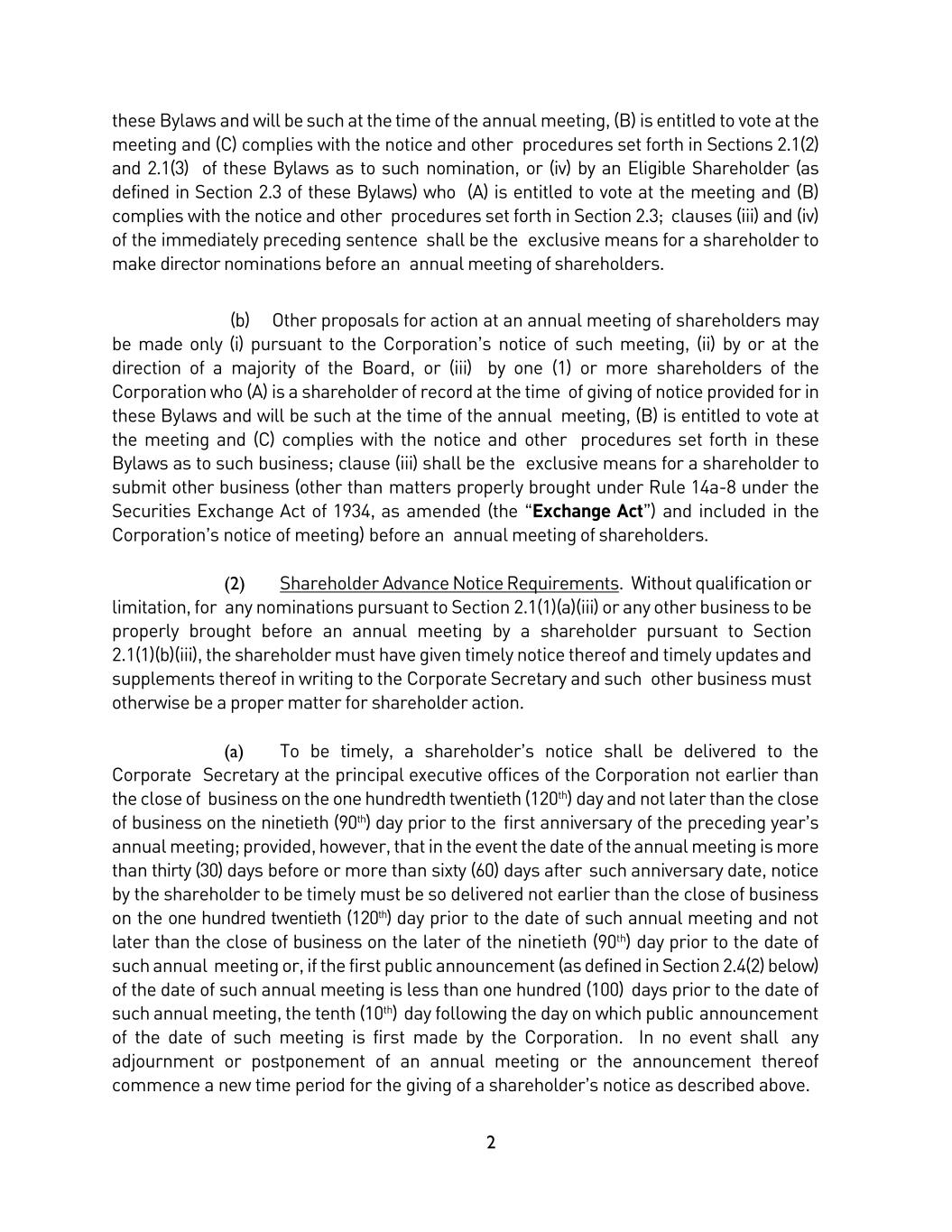
2 these Bylaws and will be such at the time of the annual meeting, (B) is entitled to vote at the meeting and (C) complies with the notice and other procedures set forth in Sections 2.1(2) and 2.1(3) of these Bylaws as to such nomination, or (iv) by an Eligible Shareholder (as defined in Section 2.3 of these Bylaws) who (A) is entitled to vote at the meeting and (B) complies with the notice and other procedures set forth in Section 2.3; clauses (iii) and (iv) of the immediately preceding sentence shall be the exclusive means for a shareholder to make director nominations before an annual meeting of shareholders. (b) Other proposals for action at an annual meeting of shareholders may be made only (i) pursuant to the Corporation’s notice of such meeting, (ii) by or at the direction of a majority of the Board, or (iii) by one (1) or more shareholders of the Corporation who (A) is a shareholder of record at the time of giving of notice provided for in these Bylaws and will be such at the time of the annual meeting, (B) is entitled to vote at the meeting and (C) complies with the notice and other procedures set forth in these Bylaws as to such business; clause (iii) shall be the exclusive means for a shareholder to submit other business (other than matters properly brought under Rule 14a-8 under the Securities Exchange Act of 1934, as amended (the “Exchange Act”) and included in the Corporation’s notice of meeting) before an annual meeting of shareholders. (2) Shareholder Advance Notice Requirements. Without qualification or limitation, for any nominations pursuant to Section 2.1(1)(a)(iii) or any other business to be properly brought before an annual meeting by a shareholder pursuant to Section 2.1(1)(b)(iii), the shareholder must have given timely notice thereof and timely updates and supplements thereof in writing to the Corporate Secretary and such other business must otherwise be a proper matter for shareholder action. (a) To be timely, a shareholder’s notice shall be delivered to the Corporate Secretary at the principal executive offices of the Corporation not earlier than the close of business on the one hundredth twentieth (120th) day and not later than the close of business on the ninetieth (90th) day prior to the first anniversary of the preceding year’s annual meeting; provided, however, that in the event the date of the annual meeting is more than thirty (30) days before or more than sixty (60) days after such anniversary date, notice by the shareholder to be timely must be so delivered not earlier than the close of business on the one hundred twentieth (120th) day prior to the date of such annual meeting and not later than the close of business on the later of the ninetieth (90th) day prior to the date of such annual meeting or, if the first public announcement (as defined in Section 2.4(2) below) of the date of such annual meeting is less than one hundred (100) days prior to the date of such annual meeting, the tenth (10th) day following the day on which public announcement of the date of such meeting is first made by the Corporation. In no event shall any adjournment or postponement of an annual meeting or the announcement thereof commence a new time period for the giving of a shareholder’s notice as described above.
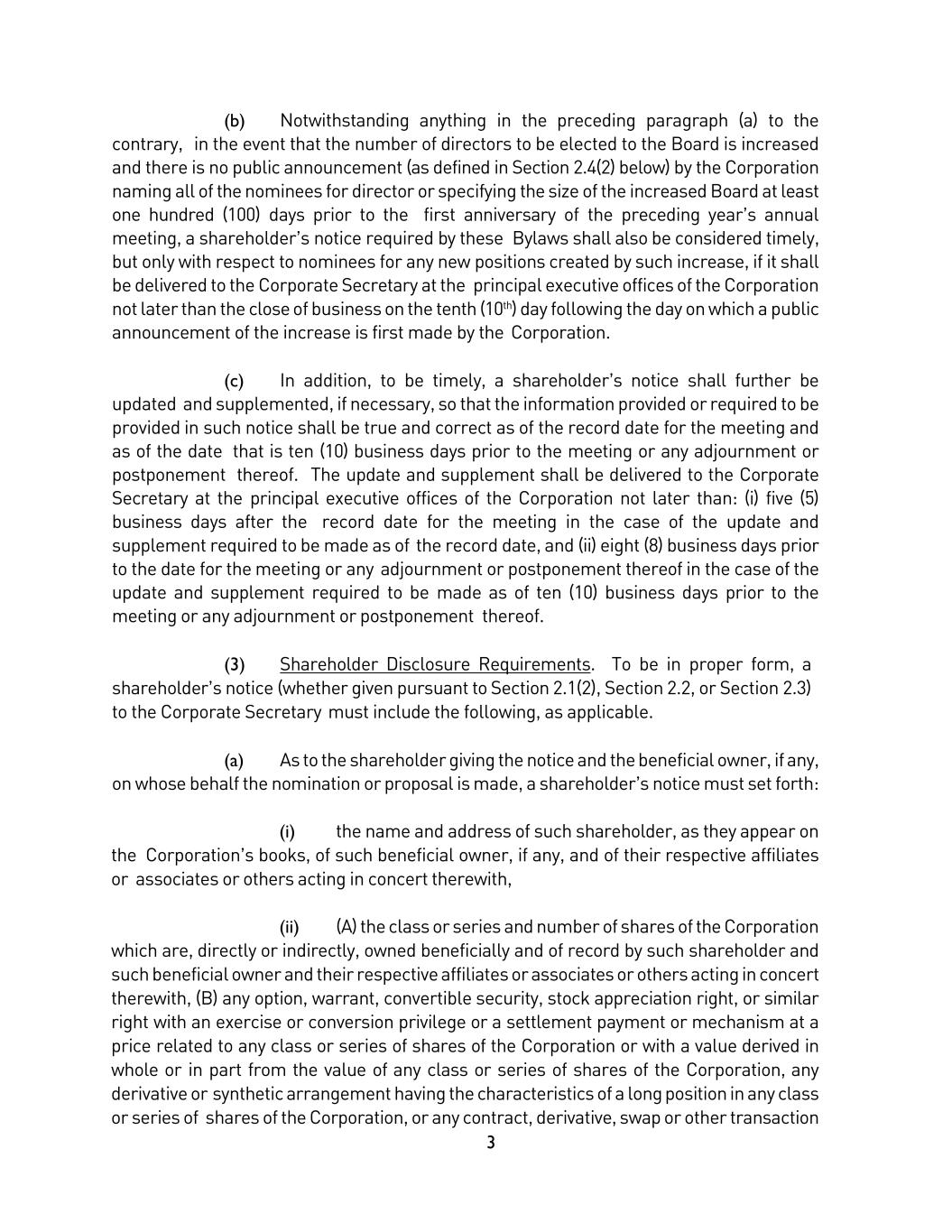
3 (b) Notwithstanding anything in the preceding paragraph (a) to the contrary, in the event that the number of directors to be elected to the Board is increased and there is no public announcement (as defined in Section 2.4(2) below) by the Corporation naming all of the nominees for director or specifying the size of the increased Board at least one hundred (100) days prior to the first anniversary of the preceding year’s annual meeting, a shareholder’s notice required by these Bylaws shall also be considered timely, but only with respect to nominees for any new positions created by such increase, if it shall be delivered to the Corporate Secretary at the principal executive offices of the Corporation not later than the close of business on the tenth (10th) day following the day on which a public announcement of the increase is first made by the Corporation. (c) In addition, to be timely, a shareholder’s notice shall further be updated and supplemented, if necessary, so that the information provided or required to be provided in such notice shall be true and correct as of the record date for the meeting and as of the date that is ten (10) business days prior to the meeting or any adjournment or postponement thereof. The update and supplement shall be delivered to the Corporate Secretary at the principal executive offices of the Corporation not later than: (i) five (5) business days after the record date for the meeting in the case of the update and supplement required to be made as of the record date, and (ii) eight (8) business days prior to the date for the meeting or any adjournment or postponement thereof in the case of the update and supplement required to be made as of ten (10) business days prior to the meeting or any adjournment or postponement thereof. (3) Shareholder Disclosure Requirements. To be in proper form, a shareholder’s notice (whether given pursuant to Section 2.1(2), Section 2.2, or Section 2.3) to the Corporate Secretary must include the following, as applicable. (a) As to the shareholder giving the notice and the beneficial owner, if any, on whose behalf the nomination or proposal is made, a shareholder’s notice must set forth: (i) the name and address of such shareholder, as they appear on the Corporation’s books, of such beneficial owner, if any, and of their respective affiliates or associates or others acting in concert therewith, (ii) (A) the class or series and number of shares of the Corporation which are, directly or indirectly, owned beneficially and of record by such shareholder and such beneficial owner and their respective affiliates or associates or others acting in concert therewith, (B) any option, warrant, convertible security, stock appreciation right, or similar right with an exercise or conversion privilege or a settlement payment or mechanism at a price related to any class or series of shares of the Corporation or with a value derived in whole or in part from the value of any class or series of shares of the Corporation, any derivative or synthetic arrangement having the characteristics of a long position in any class or series of shares of the Corporation, or any contract, derivative, swap or other transaction
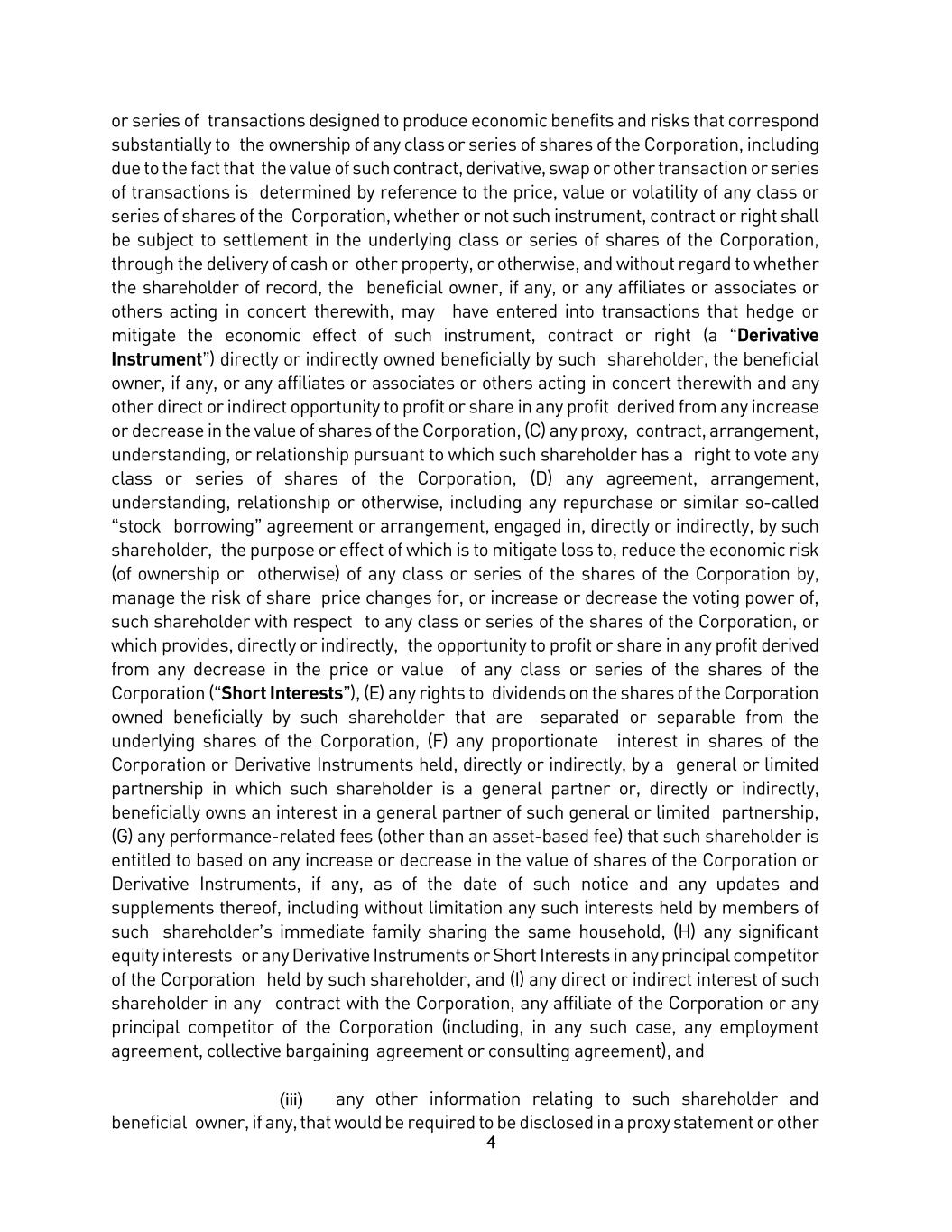
4 or series of transactions designed to produce economic benefits and risks that correspond substantially to the ownership of any class or series of shares of the Corporation, including due to the fact that the value of such contract, derivative, swap or other transaction or series of transactions is determined by reference to the price, value or volatility of any class or series of shares of the Corporation, whether or not such instrument, contract or right shall be subject to settlement in the underlying class or series of shares of the Corporation, through the delivery of cash or other property, or otherwise, and without regard to whether the shareholder of record, the beneficial owner, if any, or any affiliates or associates or others acting in concert therewith, may have entered into transactions that hedge or mitigate the economic effect of such instrument, contract or right (a “Derivative Instrument”) directly or indirectly owned beneficially by such shareholder, the beneficial owner, if any, or any affiliates or associates or others acting in concert therewith and any other direct or indirect opportunity to profit or share in any profit derived from any increase or decrease in the value of shares of the Corporation, (C) any proxy, contract, arrangement, understanding, or relationship pursuant to which such shareholder has a right to vote any class or series of shares of the Corporation, (D) any agreement, arrangement, understanding, relationship or otherwise, including any repurchase or similar so-called “stock borrowing” agreement or arrangement, engaged in, directly or indirectly, by such shareholder, the purpose or effect of which is to mitigate loss to, reduce the economic risk (of ownership or otherwise) of any class or series of the shares of the Corporation by, manage the risk of share price changes for, or increase or decrease the voting power of, such shareholder with respect to any class or series of the shares of the Corporation, or which provides, directly or indirectly, the opportunity to profit or share in any profit derived from any decrease in the price or value of any class or series of the shares of the Corporation (“Short Interests”), (E) any rights to dividends on the shares of the Corporation owned beneficially by such shareholder that are separated or separable from the underlying shares of the Corporation, (F) any proportionate interest in shares of the Corporation or Derivative Instruments held, directly or indirectly, by a general or limited partnership in which such shareholder is a general partner or, directly or indirectly, beneficially owns an interest in a general partner of such general or limited partnership, (G) any performance-related fees (other than an asset-based fee) that such shareholder is entitled to based on any increase or decrease in the value of shares of the Corporation or Derivative Instruments, if any, as of the date of such notice and any updates and supplements thereof, including without limitation any such interests held by members of such shareholder’s immediate family sharing the same household, (H) any significant equity interests or any Derivative Instruments or Short Interests in any principal competitor of the Corporation held by such shareholder, and (I) any direct or indirect interest of such shareholder in any contract with the Corporation, any affiliate of the Corporation or any principal competitor of the Corporation (including, in any such case, any employment agreement, collective bargaining agreement or consulting agreement), and (iii) any other information relating to such shareholder and beneficial owner, if any, that would be required to be disclosed in a proxy statement or other
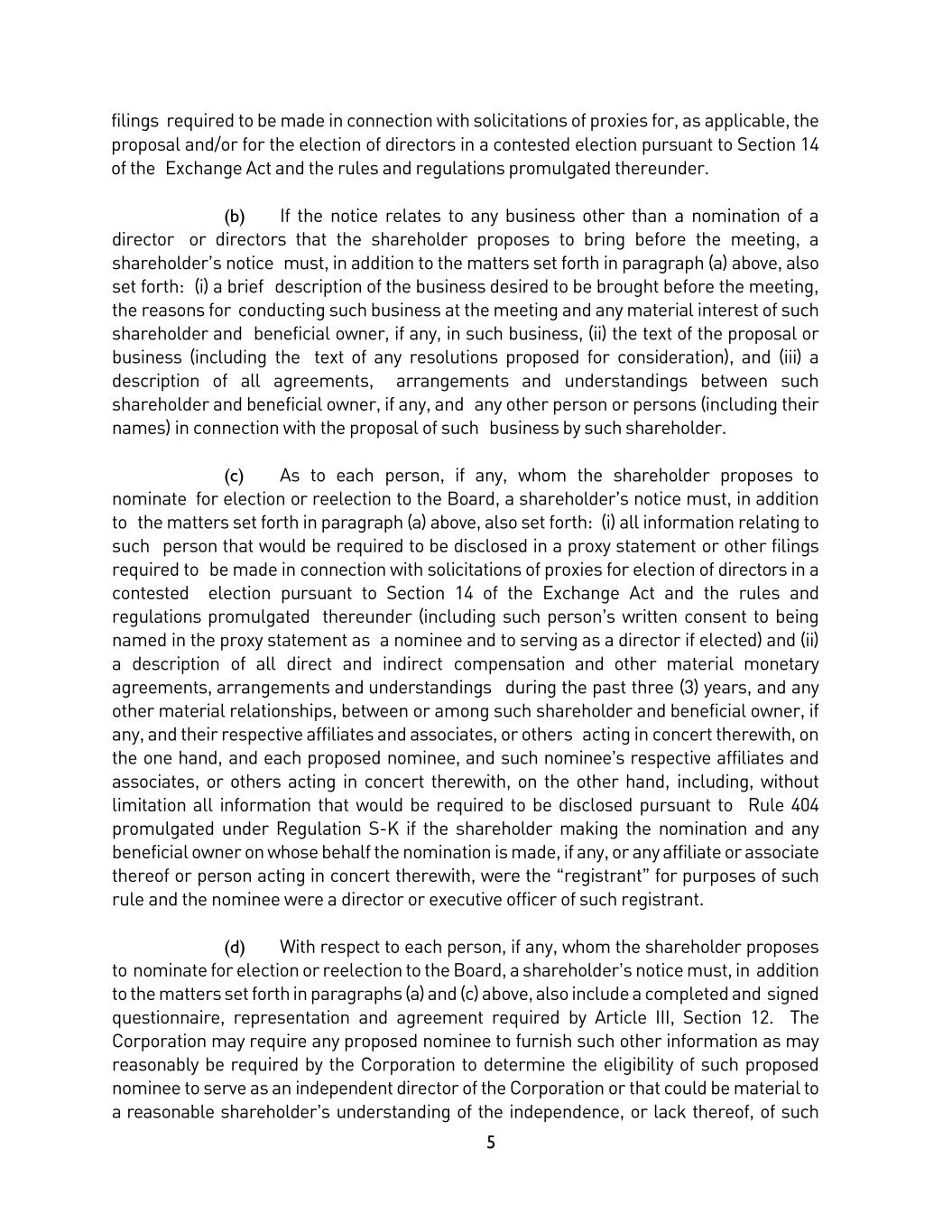
5 filings required to be made in connection with solicitations of proxies for, as applicable, the proposal and/or for the election of directors in a contested election pursuant to Section 14 of the Exchange Act and the rules and regulations promulgated thereunder. (b) If the notice relates to any business other than a nomination of a director or directors that the shareholder proposes to bring before the meeting, a shareholder’s notice must, in addition to the matters set forth in paragraph (a) above, also set forth: (i) a brief description of the business desired to be brought before the meeting, the reasons for conducting such business at the meeting and any material interest of such shareholder and beneficial owner, if any, in such business, (ii) the text of the proposal or business (including the text of any resolutions proposed for consideration), and (iii) a description of all agreements, arrangements and understandings between such shareholder and beneficial owner, if any, and any other person or persons (including their names) in connection with the proposal of such business by such shareholder. (c) As to each person, if any, whom the shareholder proposes to nominate for election or reelection to the Board, a shareholder’s notice must, in addition to the matters set forth in paragraph (a) above, also set forth: (i) all information relating to such person that would be required to be disclosed in a proxy statement or other filings required to be made in connection with solicitations of proxies for election of directors in a contested election pursuant to Section 14 of the Exchange Act and the rules and regulations promulgated thereunder (including such person’s written consent to being named in the proxy statement as a nominee and to serving as a director if elected) and (ii) a description of all direct and indirect compensation and other material monetary agreements, arrangements and understandings during the past three (3) years, and any other material relationships, between or among such shareholder and beneficial owner, if any, and their respective affiliates and associates, or others acting in concert therewith, on the one hand, and each proposed nominee, and such nominee’s respective affiliates and associates, or others acting in concert therewith, on the other hand, including, without limitation all information that would be required to be disclosed pursuant to Rule 404 promulgated under Regulation S-K if the shareholder making the nomination and any beneficial owner on whose behalf the nomination is made, if any, or any affiliate or associate thereof or person acting in concert therewith, were the “registrant” for purposes of such rule and the nominee were a director or executive officer of such registrant. (d) With respect to each person, if any, whom the shareholder proposes to nominate for election or reelection to the Board, a shareholder’s notice must, in addition to the matters set forth in paragraphs (a) and (c) above, also include a completed and signed questionnaire, representation and agreement required by Article III, Section 12. The Corporation may require any proposed nominee to furnish such other information as may reasonably be required by the Corporation to determine the eligibility of such proposed nominee to serve as an independent director of the Corporation or that could be material to a reasonable shareholder’s understanding of the independence, or lack thereof, of such
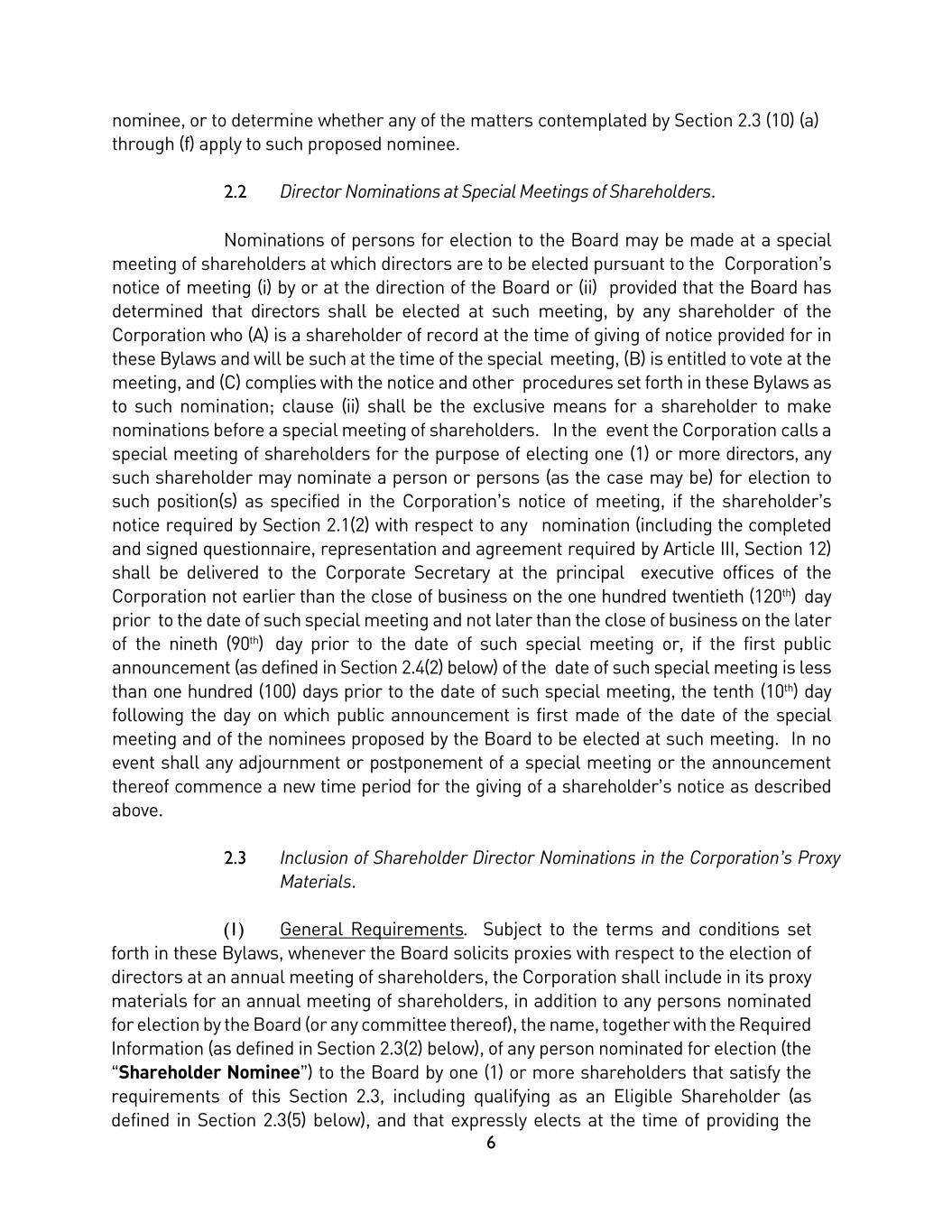
6 nominee, or to determine whether any of the matters contemplated by Section 2.3 (10) (a) through (f) apply to such proposed nominee. 2.2 Director Nominations at Special Meetings of Shareholders. Nominations of persons for election to the Board may be made at a special meeting of shareholders at which directors are to be elected pursuant to the Corporation’s notice of meeting (i) by or at the direction of the Board or (ii) provided that the Board has determined that directors shall be elected at such meeting, by any shareholder of the Corporation who (A) is a shareholder of record at the time of giving of notice provided for in these Bylaws and will be such at the time of the special meeting, (B) is entitled to vote at the meeting, and (C) complies with the notice and other procedures set forth in these Bylaws as to such nomination; clause (ii) shall be the exclusive means for a shareholder to make nominations before a special meeting of shareholders. In the event the Corporation calls a special meeting of shareholders for the purpose of electing one (1) or more directors, any such shareholder may nominate a person or persons (as the case may be) for election to such position(s) as specified in the Corporation’s notice of meeting, if the shareholder’s notice required by Section 2.1(2) with respect to any nomination (including the completed and signed questionnaire, representation and agreement required by Article III, Section 12) shall be delivered to the Corporate Secretary at the principal executive offices of the Corporation not earlier than the close of business on the one hundred twentieth (120th) day prior to the date of such special meeting and not later than the close of business on the later of the nineth (90th) day prior to the date of such special meeting or, if the first public announcement (as defined in Section 2.4(2) below) of the date of such special meeting is less than one hundred (100) days prior to the date of such special meeting, the tenth (10th) day following the day on which public announcement is first made of the date of the special meeting and of the nominees proposed by the Board to be elected at such meeting. In no event shall any adjournment or postponement of a special meeting or the announcement thereof commence a new time period for the giving of a shareholder’s notice as described above. 2.3 Inclusion of Shareholder Director Nominations in the Corporation’s Proxy Materials. (1) General Requirements. Subject to the terms and conditions set forth in these Bylaws, whenever the Board solicits proxies with respect to the election of directors at an annual meeting of shareholders, the Corporation shall include in its proxy materials for an annual meeting of shareholders, in addition to any persons nominated for election by the Board (or any committee thereof), the name, together with the Required Information (as defined in Section 2.3(2) below), of any person nominated for election (the “Shareholder Nominee”) to the Board by one (1) or more shareholders that satisfy the requirements of this Section 2.3, including qualifying as an Eligible Shareholder (as defined in Section 2.3(5) below), and that expressly elects at the time of providing the
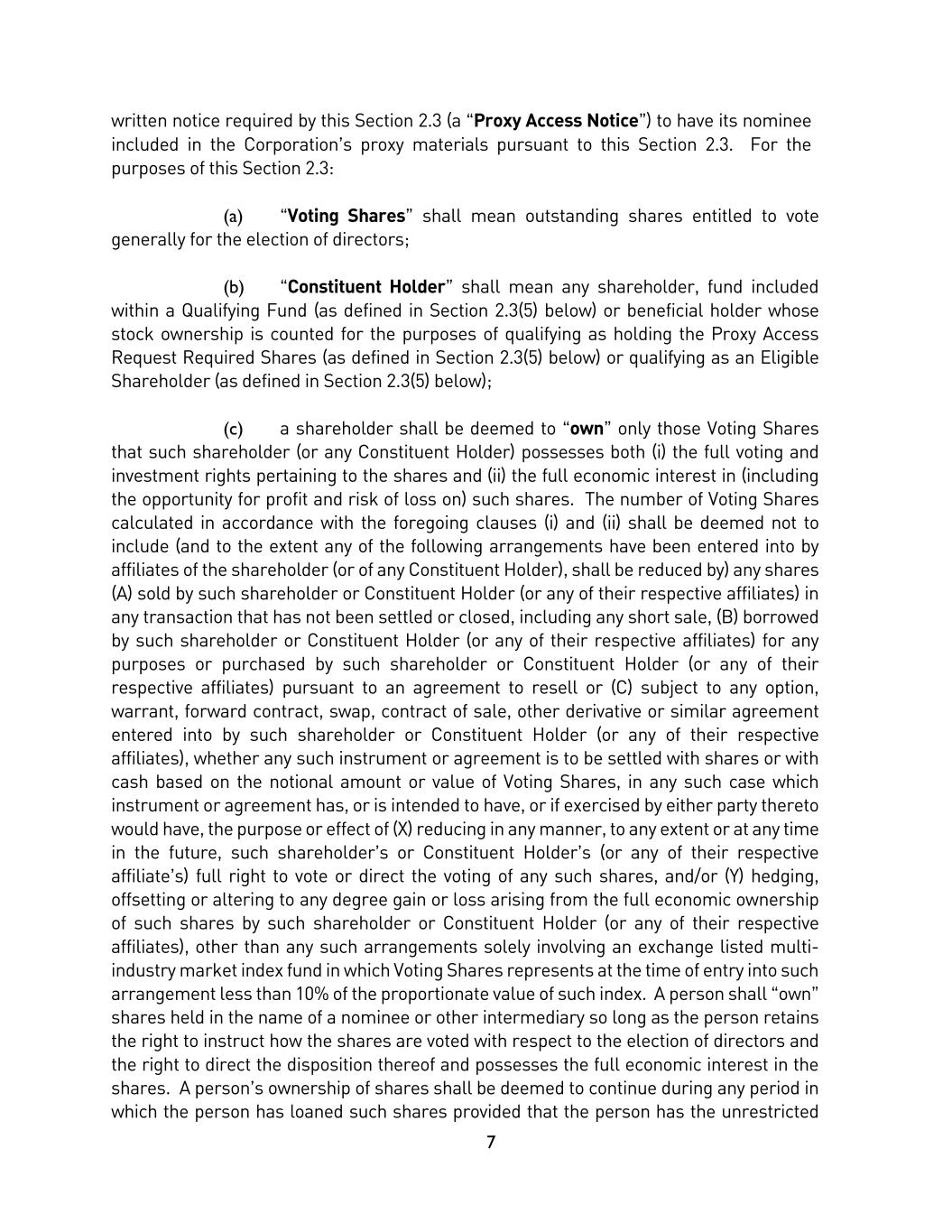
7 written notice required by this Section 2.3 (a “Proxy Access Notice”) to have its nominee included in the Corporation’s proxy materials pursuant to this Section 2.3. For the purposes of this Section 2.3: (a) “Voting Shares” shall mean outstanding shares entitled to vote generally for the election of directors; (b) “Constituent Holder” shall mean any shareholder, fund included within a Qualifying Fund (as defined in Section 2.3(5) below) or beneficial holder whose stock ownership is counted for the purposes of qualifying as holding the Proxy Access Request Required Shares (as defined in Section 2.3(5) below) or qualifying as an Eligible Shareholder (as defined in Section 2.3(5) below); (c) a shareholder shall be deemed to “own” only those Voting Shares that such shareholder (or any Constituent Holder) possesses both (i) the full voting and investment rights pertaining to the shares and (ii) the full economic interest in (including the opportunity for profit and risk of loss on) such shares. The number of Voting Shares calculated in accordance with the foregoing clauses (i) and (ii) shall be deemed not to include (and to the extent any of the following arrangements have been entered into by affiliates of the shareholder (or of any Constituent Holder), shall be reduced by) any shares (A) sold by such shareholder or Constituent Holder (or any of their respective affiliates) in any transaction that has not been settled or closed, including any short sale, (B) borrowed by such shareholder or Constituent Holder (or any of their respective affiliates) for any purposes or purchased by such shareholder or Constituent Holder (or any of their respective affiliates) pursuant to an agreement to resell or (C) subject to any option, warrant, forward contract, swap, contract of sale, other derivative or similar agreement entered into by such shareholder or Constituent Holder (or any of their respective affiliates), whether any such instrument or agreement is to be settled with shares or with cash based on the notional amount or value of Voting Shares, in any such case which instrument or agreement has, or is intended to have, or if exercised by either party thereto would have, the purpose or effect of (X) reducing in any manner, to any extent or at any time in the future, such shareholder’s or Constituent Holder’s (or any of their respective affiliate’s) full right to vote or direct the voting of any such shares, and/or (Y) hedging, offsetting or altering to any degree gain or loss arising from the full economic ownership of such shares by such shareholder or Constituent Holder (or any of their respective affiliates), other than any such arrangements solely involving an exchange listed multi- industry market index fund in which Voting Shares represents at the time of entry into such arrangement less than 10% of the proportionate value of such index. A person shall “own” shares held in the name of a nominee or other intermediary so long as the person retains the right to instruct how the shares are voted with respect to the election of directors and the right to direct the disposition thereof and possesses the full economic interest in the shares. A person’s ownership of shares shall be deemed to continue during any period in which the person has loaned such shares provided that the person has the unrestricted
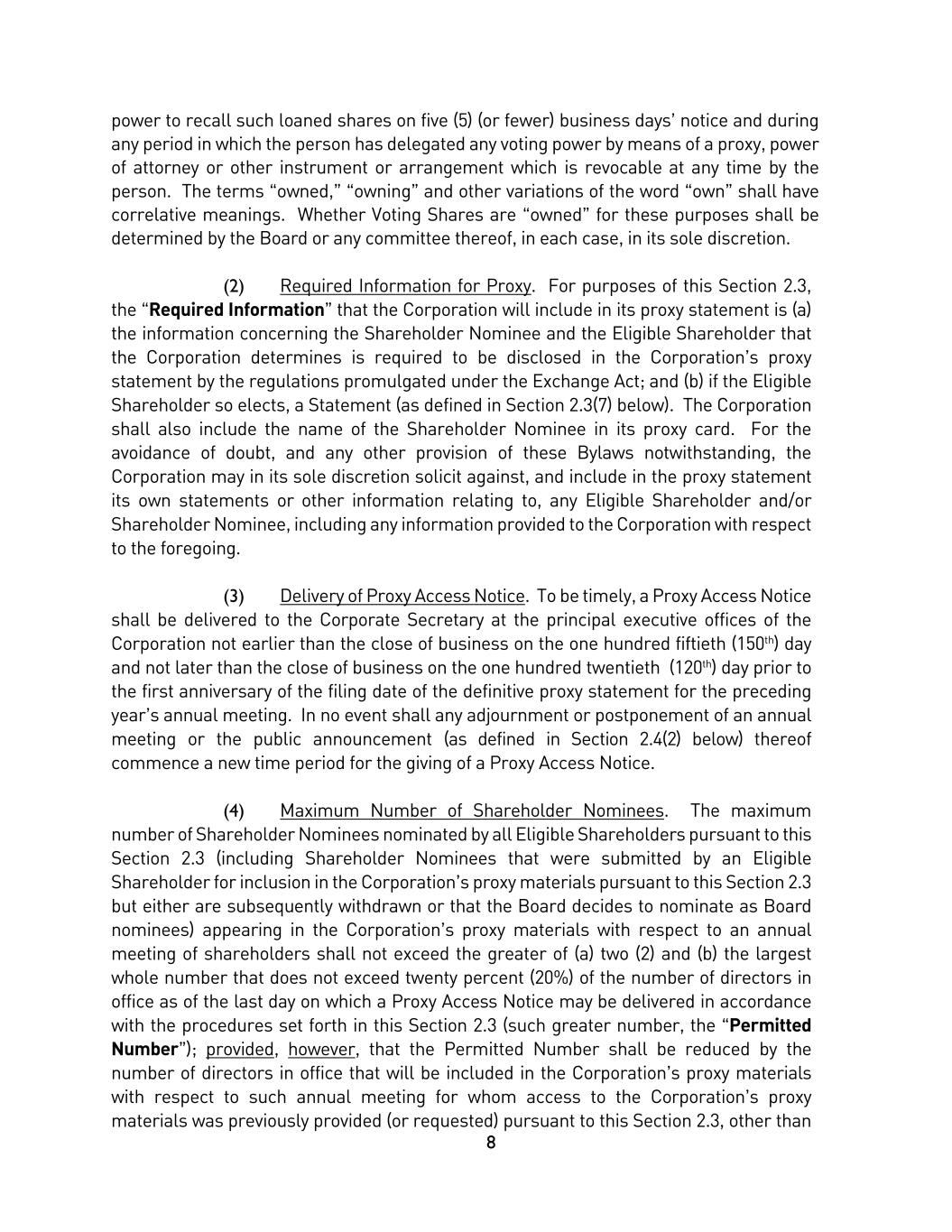
8 power to recall such loaned shares on five (5) (or fewer) business days’ notice and during any period in which the person has delegated any voting power by means of a proxy, power of attorney or other instrument or arrangement which is revocable at any time by the person. The terms “owned,” “owning” and other variations of the word “own” shall have correlative meanings. Whether Voting Shares are “owned” for these purposes shall be determined by the Board or any committee thereof, in each case, in its sole discretion. (2) Required Information for Proxy. For purposes of this Section 2.3, the “Required Information” that the Corporation will include in its proxy statement is (a) the information concerning the Shareholder Nominee and the Eligible Shareholder that the Corporation determines is required to be disclosed in the Corporation’s proxy statement by the regulations promulgated under the Exchange Act; and (b) if the Eligible Shareholder so elects, a Statement (as defined in Section 2.3(7) below). The Corporation shall also include the name of the Shareholder Nominee in its proxy card. For the avoidance of doubt, and any other provision of these Bylaws notwithstanding, the Corporation may in its sole discretion solicit against, and include in the proxy statement its own statements or other information relating to, any Eligible Shareholder and/or Shareholder Nominee, including any information provided to the Corporation with respect to the foregoing. (3) Delivery of Proxy Access Notice. To be timely, a Proxy Access Notice shall be delivered to the Corporate Secretary at the principal executive offices of the Corporation not earlier than the close of business on the one hundred fiftieth (150th) day and not later than the close of business on the one hundred twentieth (120th) day prior to the first anniversary of the filing date of the definitive proxy statement for the preceding year’s annual meeting. In no event shall any adjournment or postponement of an annual meeting or the public announcement (as defined in Section 2.4(2) below) thereof commence a new time period for the giving of a Proxy Access Notice. (4) Maximum Number of Shareholder Nominees. The maximum number of Shareholder Nominees nominated by all Eligible Shareholders pursuant to this Section 2.3 (including Shareholder Nominees that were submitted by an Eligible Shareholder for inclusion in the Corporation’s proxy materials pursuant to this Section 2.3 but either are subsequently withdrawn or that the Board decides to nominate as Board nominees) appearing in the Corporation’s proxy materials with respect to an annual meeting of shareholders shall not exceed the greater of (a) two (2) and (b) the largest whole number that does not exceed twenty percent (20%) of the number of directors in office as of the last day on which a Proxy Access Notice may be delivered in accordance with the procedures set forth in this Section 2.3 (such greater number, the “Permitted Number”); provided, however, that the Permitted Number shall be reduced by the number of directors in office that will be included in the Corporation’s proxy materials with respect to such annual meeting for whom access to the Corporation’s proxy materials was previously provided (or requested) pursuant to this Section 2.3, other than
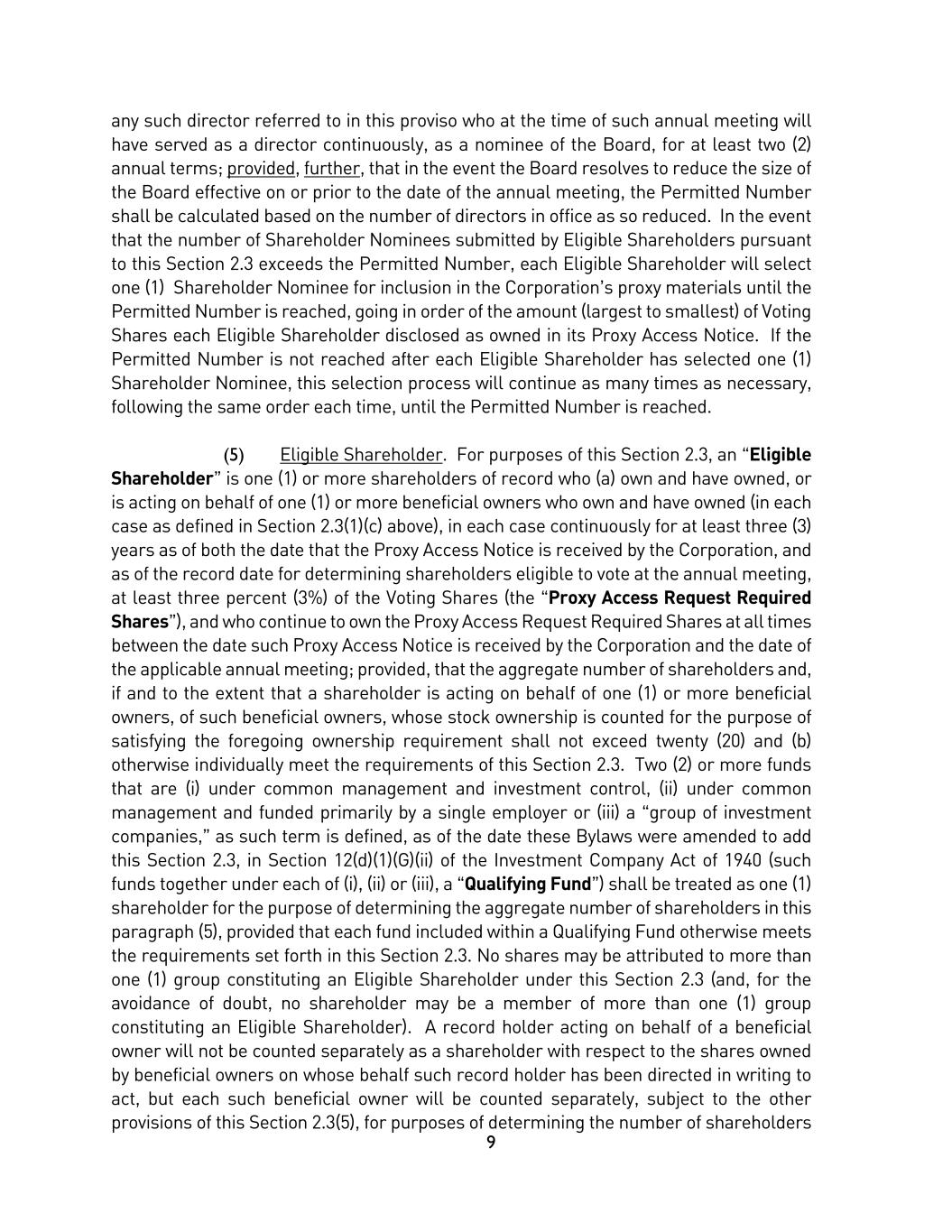
9 any such director referred to in this proviso who at the time of such annual meeting will have served as a director continuously, as a nominee of the Board, for at least two (2) annual terms; provided, further, that in the event the Board resolves to reduce the size of the Board effective on or prior to the date of the annual meeting, the Permitted Number shall be calculated based on the number of directors in office as so reduced. In the event that the number of Shareholder Nominees submitted by Eligible Shareholders pursuant to this Section 2.3 exceeds the Permitted Number, each Eligible Shareholder will select one (1) Shareholder Nominee for inclusion in the Corporation’s proxy materials until the Permitted Number is reached, going in order of the amount (largest to smallest) of Voting Shares each Eligible Shareholder disclosed as owned in its Proxy Access Notice. If the Permitted Number is not reached after each Eligible Shareholder has selected one (1) Shareholder Nominee, this selection process will continue as many times as necessary, following the same order each time, until the Permitted Number is reached. (5) Eligible Shareholder. For purposes of this Section 2.3, an “Eligible Shareholder” is one (1) or more shareholders of record who (a) own and have owned, or is acting on behalf of one (1) or more beneficial owners who own and have owned (in each case as defined in Section 2.3(1)(c) above), in each case continuously for at least three (3) years as of both the date that the Proxy Access Notice is received by the Corporation, and as of the record date for determining shareholders eligible to vote at the annual meeting, at least three percent (3%) of the Voting Shares (the “Proxy Access Request Required Shares”), and who continue to own the Proxy Access Request Required Shares at all times between the date such Proxy Access Notice is received by the Corporation and the date of the applicable annual meeting; provided, that the aggregate number of shareholders and, if and to the extent that a shareholder is acting on behalf of one (1) or more beneficial owners, of such beneficial owners, whose stock ownership is counted for the purpose of satisfying the foregoing ownership requirement shall not exceed twenty (20) and (b) otherwise individually meet the requirements of this Section 2.3. Two (2) or more funds that are (i) under common management and investment control, (ii) under common management and funded primarily by a single employer or (iii) a “group of investment companies,” as such term is defined, as of the date these Bylaws were amended to add this Section 2.3, in Section 12(d)(1)(G)(ii) of the Investment Company Act of 1940 (such funds together under each of (i), (ii) or (iii), a “Qualifying Fund”) shall be treated as one (1) shareholder for the purpose of determining the aggregate number of shareholders in this paragraph (5), provided that each fund included within a Qualifying Fund otherwise meets the requirements set forth in this Section 2.3. No shares may be attributed to more than one (1) group constituting an Eligible Shareholder under this Section 2.3 (and, for the avoidance of doubt, no shareholder may be a member of more than one (1) group constituting an Eligible Shareholder). A record holder acting on behalf of a beneficial owner will not be counted separately as a shareholder with respect to the shares owned by beneficial owners on whose behalf such record holder has been directed in writing to act, but each such beneficial owner will be counted separately, subject to the other provisions of this Section 2.3(5), for purposes of determining the number of shareholders
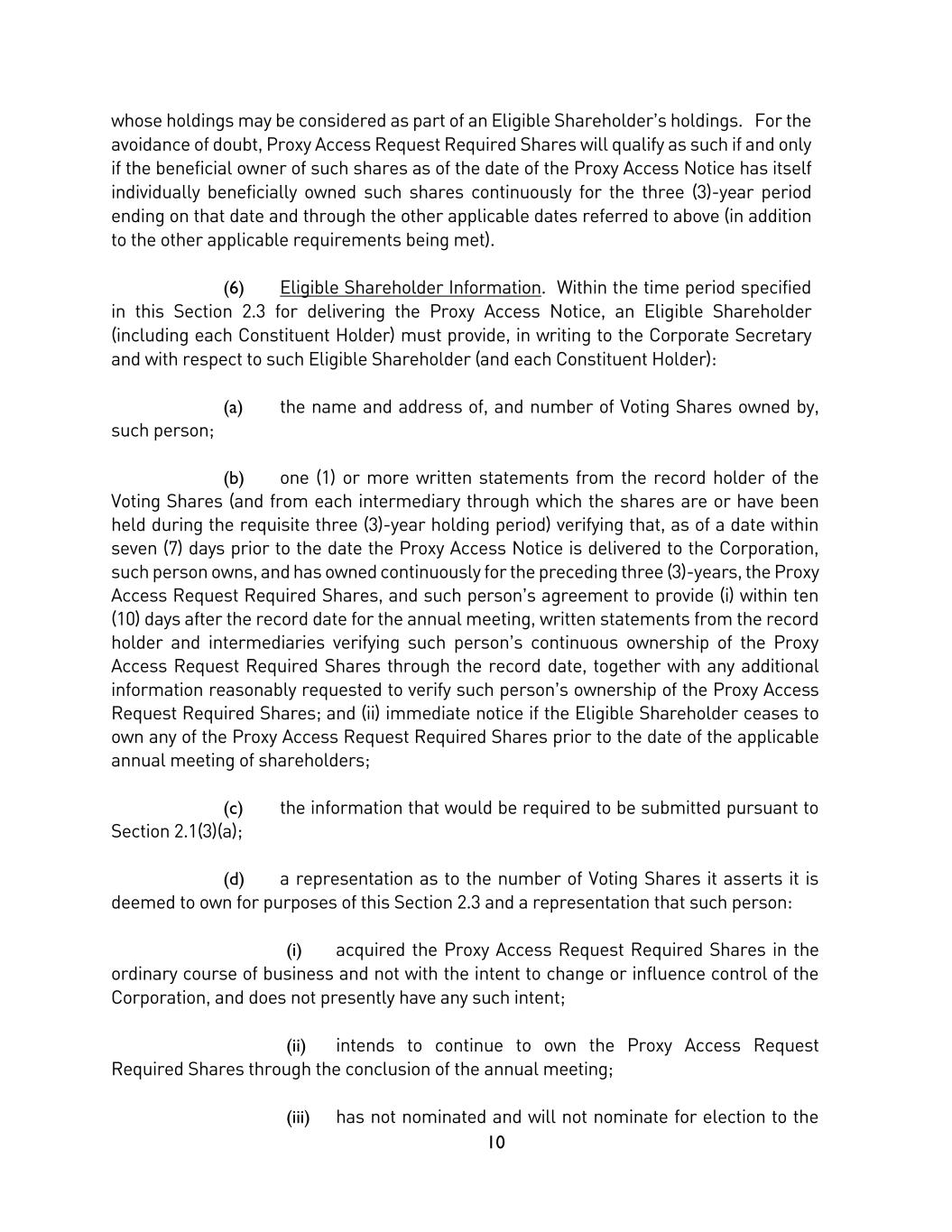
10 whose holdings may be considered as part of an Eligible Shareholder’s holdings. For the avoidance of doubt, Proxy Access Request Required Shares will qualify as such if and only if the beneficial owner of such shares as of the date of the Proxy Access Notice has itself individually beneficially owned such shares continuously for the three (3)-year period ending on that date and through the other applicable dates referred to above (in addition to the other applicable requirements being met). (6) Eligible Shareholder Information. Within the time period specified in this Section 2.3 for delivering the Proxy Access Notice, an Eligible Shareholder (including each Constituent Holder) must provide, in writing to the Corporate Secretary and with respect to such Eligible Shareholder (and each Constituent Holder): (a) the name and address of, and number of Voting Shares owned by, such person; (b) one (1) or more written statements from the record holder of the Voting Shares (and from each intermediary through which the shares are or have been held during the requisite three (3)-year holding period) verifying that, as of a date within seven (7) days prior to the date the Proxy Access Notice is delivered to the Corporation, such person owns, and has owned continuously for the preceding three (3)-years, the Proxy Access Request Required Shares, and such person’s agreement to provide (i) within ten (10) days after the record date for the annual meeting, written statements from the record holder and intermediaries verifying such person’s continuous ownership of the Proxy Access Request Required Shares through the record date, together with any additional information reasonably requested to verify such person’s ownership of the Proxy Access Request Required Shares; and (ii) immediate notice if the Eligible Shareholder ceases to own any of the Proxy Access Request Required Shares prior to the date of the applicable annual meeting of shareholders; (c) the information that would be required to be submitted pursuant to Section 2.1(3)(a); (d) a representation as to the number of Voting Shares it asserts it is deemed to own for purposes of this Section 2.3 and a representation that such person: (i) acquired the Proxy Access Request Required Shares in the ordinary course of business and not with the intent to change or influence control of the Corporation, and does not presently have any such intent; (ii) intends to continue to own the Proxy Access Request Required Shares through the conclusion of the annual meeting; (iii) has not nominated and will not nominate for election to the
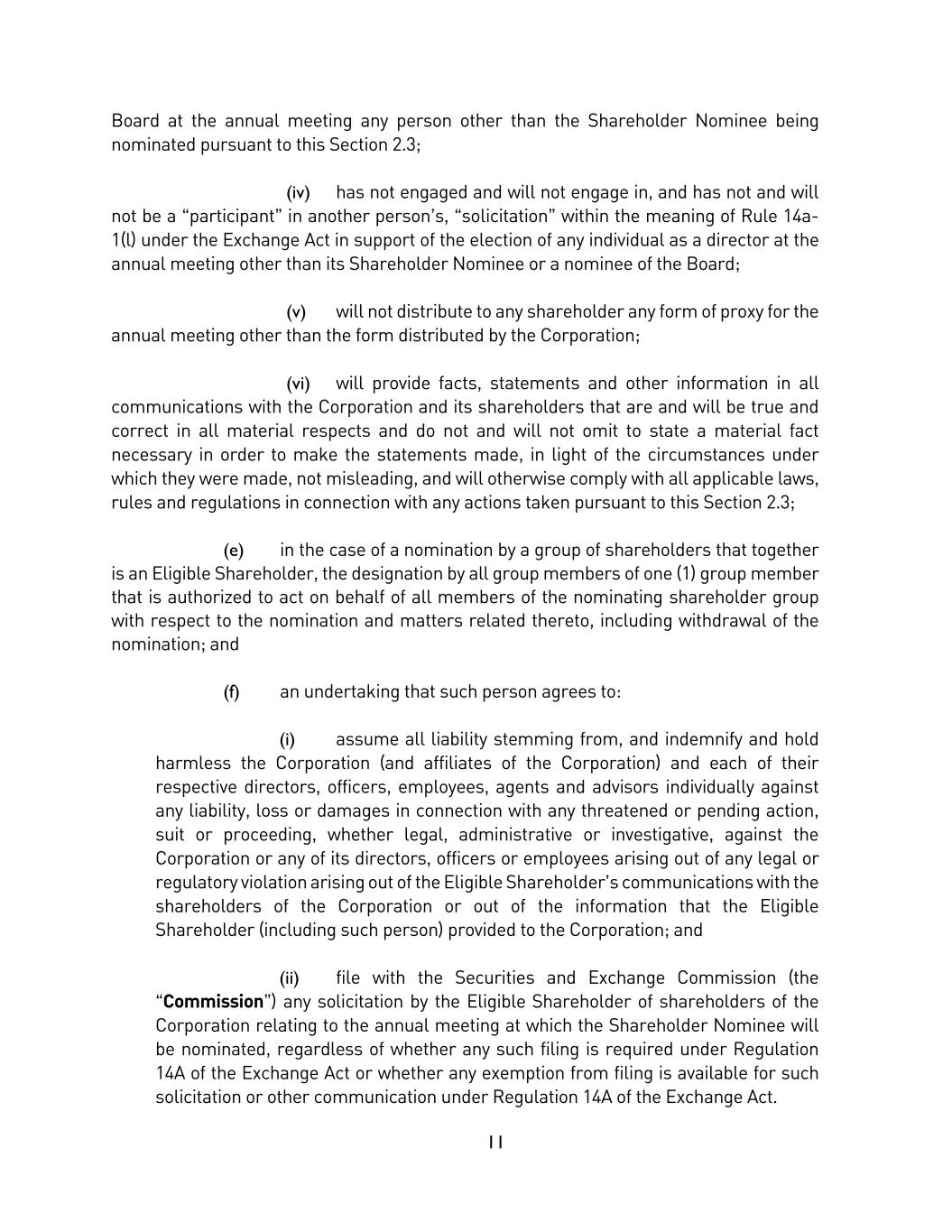
11 Board at the annual meeting any person other than the Shareholder Nominee being nominated pursuant to this Section 2.3; (iv) has not engaged and will not engage in, and has not and will not be a “participant” in another person’s, “solicitation” within the meaning of Rule 14a- 1(l) under the Exchange Act in support of the election of any individual as a director at the annual meeting other than its Shareholder Nominee or a nominee of the Board; (v) will not distribute to any shareholder any form of proxy for the annual meeting other than the form distributed by the Corporation; (vi) will provide facts, statements and other information in all communications with the Corporation and its shareholders that are and will be true and correct in all material respects and do not and will not omit to state a material fact necessary in order to make the statements made, in light of the circumstances under which they were made, not misleading, and will otherwise comply with all applicable laws, rules and regulations in connection with any actions taken pursuant to this Section 2.3; (e) in the case of a nomination by a group of shareholders that together is an Eligible Shareholder, the designation by all group members of one (1) group member that is authorized to act on behalf of all members of the nominating shareholder group with respect to the nomination and matters related thereto, including withdrawal of the nomination; and (f) an undertaking that such person agrees to: (i) assume all liability stemming from, and indemnify and hold harmless the Corporation (and affiliates of the Corporation) and each of their respective directors, officers, employees, agents and advisors individually against any liability, loss or damages in connection with any threatened or pending action, suit or proceeding, whether legal, administrative or investigative, against the Corporation or any of its directors, officers or employees arising out of any legal or regulatory violation arising out of the Eligible Shareholder’s communications with the shareholders of the Corporation or out of the information that the Eligible Shareholder (including such person) provided to the Corporation; and (ii) file with the Securities and Exchange Commission (the “Commission”) any solicitation by the Eligible Shareholder of shareholders of the Corporation relating to the annual meeting at which the Shareholder Nominee will be nominated, regardless of whether any such filing is required under Regulation 14A of the Exchange Act or whether any exemption from filing is available for such solicitation or other communication under Regulation 14A of the Exchange Act.
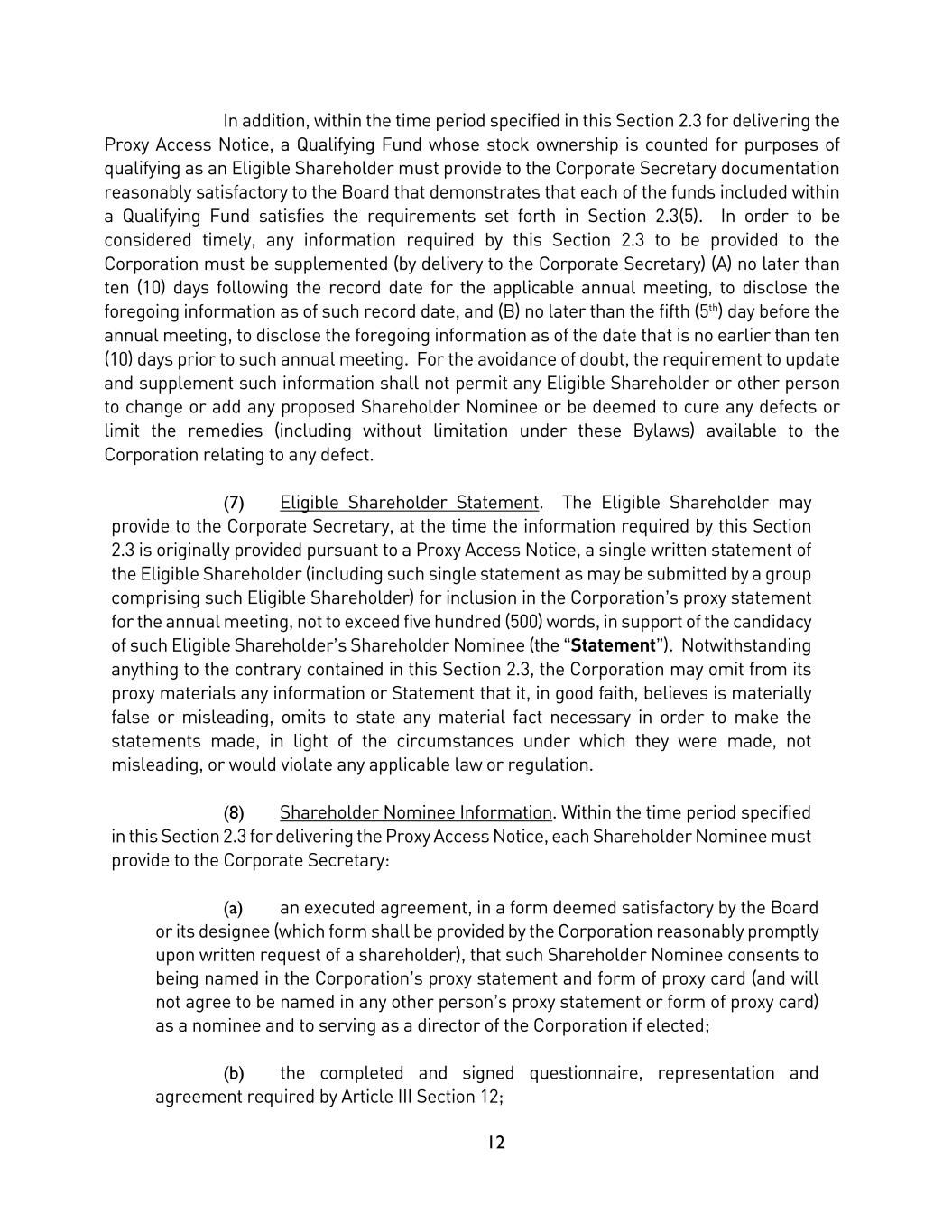
12 In addition, within the time period specified in this Section 2.3 for delivering the Proxy Access Notice, a Qualifying Fund whose stock ownership is counted for purposes of qualifying as an Eligible Shareholder must provide to the Corporate Secretary documentation reasonably satisfactory to the Board that demonstrates that each of the funds included within a Qualifying Fund satisfies the requirements set forth in Section 2.3(5). In order to be considered timely, any information required by this Section 2.3 to be provided to the Corporation must be supplemented (by delivery to the Corporate Secretary) (A) no later than ten (10) days following the record date for the applicable annual meeting, to disclose the foregoing information as of such record date, and (B) no later than the fifth (5th) day before the annual meeting, to disclose the foregoing information as of the date that is no earlier than ten (10) days prior to such annual meeting. For the avoidance of doubt, the requirement to update and supplement such information shall not permit any Eligible Shareholder or other person to change or add any proposed Shareholder Nominee or be deemed to cure any defects or limit the remedies (including without limitation under these Bylaws) available to the Corporation relating to any defect. (7) Eligible Shareholder Statement. The Eligible Shareholder may provide to the Corporate Secretary, at the time the information required by this Section 2.3 is originally provided pursuant to a Proxy Access Notice, a single written statement of the Eligible Shareholder (including such single statement as may be submitted by a group comprising such Eligible Shareholder) for inclusion in the Corporation’s proxy statement for the annual meeting, not to exceed five hundred (500) words, in support of the candidacy of such Eligible Shareholder’s Shareholder Nominee (the “Statement”). Notwithstanding anything to the contrary contained in this Section 2.3, the Corporation may omit from its proxy materials any information or Statement that it, in good faith, believes is materially false or misleading, omits to state any material fact necessary in order to make the statements made, in light of the circumstances under which they were made, not misleading, or would violate any applicable law or regulation. (8) Shareholder Nominee Information. Within the time period specified in this Section 2.3 for delivering the Proxy Access Notice, each Shareholder Nominee must provide to the Corporate Secretary: (a) an executed agreement, in a form deemed satisfactory by the Board or its designee (which form shall be provided by the Corporation reasonably promptly upon written request of a shareholder), that such Shareholder Nominee consents to being named in the Corporation’s proxy statement and form of proxy card (and will not agree to be named in any other person’s proxy statement or form of proxy card) as a nominee and to serving as a director of the Corporation if elected; (b) the completed and signed questionnaire, representation and agreement required by Article III Section 12;
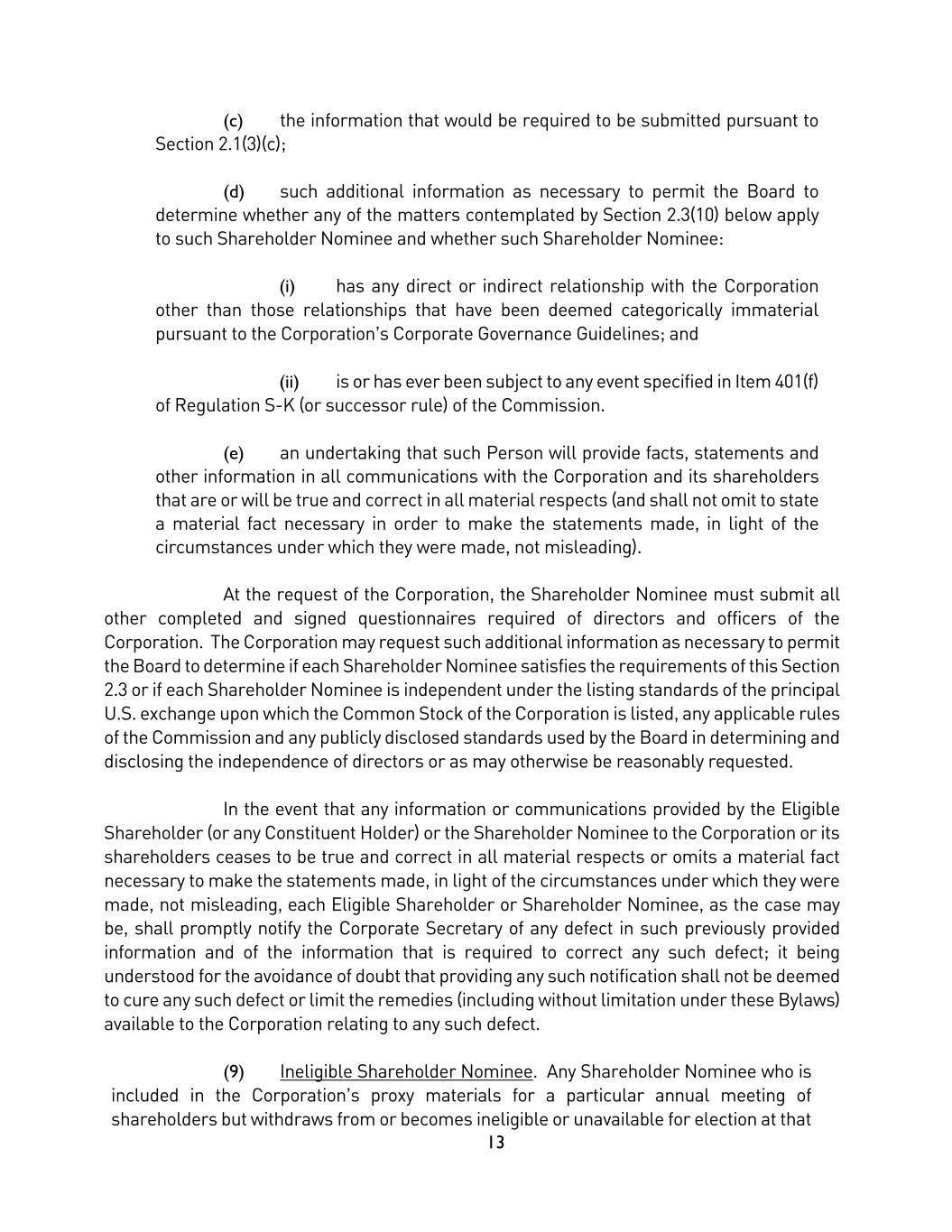
13 (c) the information that would be required to be submitted pursuant to Section 2.1(3)(c); (d) such additional information as necessary to permit the Board to determine whether any of the matters contemplated by Section 2.3(10) below apply to such Shareholder Nominee and whether such Shareholder Nominee: (i) has any direct or indirect relationship with the Corporation other than those relationships that have been deemed categorically immaterial pursuant to the Corporation’s Corporate Governance Guidelines; and (ii) is or has ever been subject to any event specified in Item 401(f) of Regulation S-K (or successor rule) of the Commission. (e) an undertaking that such Person will provide facts, statements and other information in all communications with the Corporation and its shareholders that are or will be true and correct in all material respects (and shall not omit to state a material fact necessary in order to make the statements made, in light of the circumstances under which they were made, not misleading). At the request of the Corporation, the Shareholder Nominee must submit all other completed and signed questionnaires required of directors and officers of the Corporation. The Corporation may request such additional information as necessary to permit the Board to determine if each Shareholder Nominee satisfies the requirements of this Section 2.3 or if each Shareholder Nominee is independent under the listing standards of the principal U.S. exchange upon which the Common Stock of the Corporation is listed, any applicable rules of the Commission and any publicly disclosed standards used by the Board in determining and disclosing the independence of directors or as may otherwise be reasonably requested. In the event that any information or communications provided by the Eligible Shareholder (or any Constituent Holder) or the Shareholder Nominee to the Corporation or its shareholders ceases to be true and correct in all material respects or omits a material fact necessary to make the statements made, in light of the circumstances under which they were made, not misleading, each Eligible Shareholder or Shareholder Nominee, as the case may be, shall promptly notify the Corporate Secretary of any defect in such previously provided information and of the information that is required to correct any such defect; it being understood for the avoidance of doubt that providing any such notification shall not be deemed to cure any such defect or limit the remedies (including without limitation under these Bylaws) available to the Corporation relating to any such defect. (9) Ineligible Shareholder Nominee. Any Shareholder Nominee who is included in the Corporation’s proxy materials for a particular annual meeting of shareholders but withdraws from or becomes ineligible or unavailable for election at that
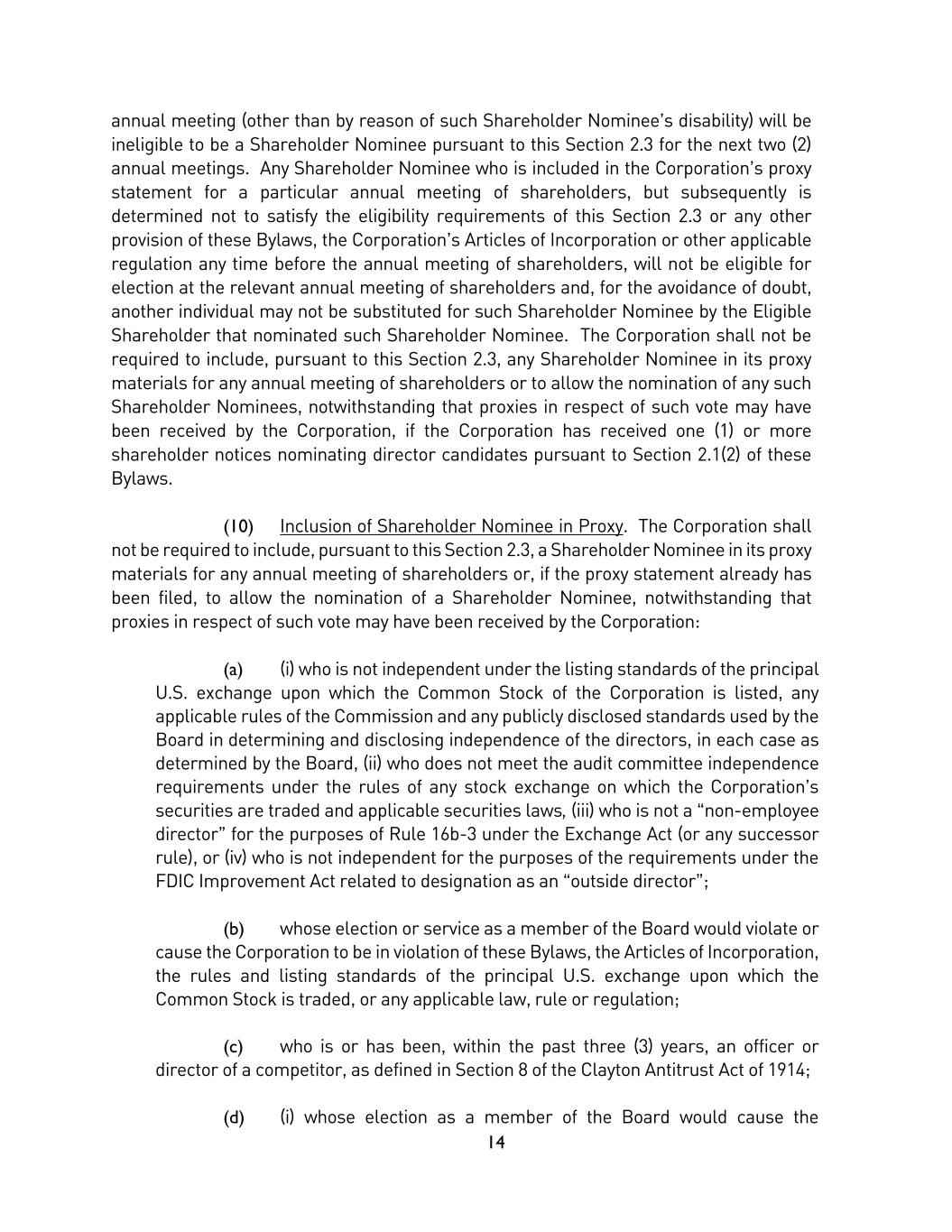
14 annual meeting (other than by reason of such Shareholder Nominee’s disability) will be ineligible to be a Shareholder Nominee pursuant to this Section 2.3 for the next two (2) annual meetings. Any Shareholder Nominee who is included in the Corporation’s proxy statement for a particular annual meeting of shareholders, but subsequently is determined not to satisfy the eligibility requirements of this Section 2.3 or any other provision of these Bylaws, the Corporation’s Articles of Incorporation or other applicable regulation any time before the annual meeting of shareholders, will not be eligible for election at the relevant annual meeting of shareholders and, for the avoidance of doubt, another individual may not be substituted for such Shareholder Nominee by the Eligible Shareholder that nominated such Shareholder Nominee. The Corporation shall not be required to include, pursuant to this Section 2.3, any Shareholder Nominee in its proxy materials for any annual meeting of shareholders or to allow the nomination of any such Shareholder Nominees, notwithstanding that proxies in respect of such vote may have been received by the Corporation, if the Corporation has received one (1) or more shareholder notices nominating director candidates pursuant to Section 2.1(2) of these Bylaws. (10) Inclusion of Shareholder Nominee in Proxy. The Corporation shall not be required to include, pursuant to this Section 2.3, a Shareholder Nominee in its proxy materials for any annual meeting of shareholders or, if the proxy statement already has been filed, to allow the nomination of a Shareholder Nominee, notwithstanding that proxies in respect of such vote may have been received by the Corporation: (a) (i) who is not independent under the listing standards of the principal U.S. exchange upon which the Common Stock of the Corporation is listed, any applicable rules of the Commission and any publicly disclosed standards used by the Board in determining and disclosing independence of the directors, in each case as determined by the Board, (ii) who does not meet the audit committee independence requirements under the rules of any stock exchange on which the Corporation’s securities are traded and applicable securities laws, (iii) who is not a “non-employee director” for the purposes of Rule 16b-3 under the Exchange Act (or any successor rule), or (iv) who is not independent for the purposes of the requirements under the FDIC Improvement Act related to designation as an “outside director”; (b) whose election or service as a member of the Board would violate or cause the Corporation to be in violation of these Bylaws, the Articles of Incorporation, the rules and listing standards of the principal U.S. exchange upon which the Common Stock is traded, or any applicable law, rule or regulation; (c) who is or has been, within the past three (3) years, an officer or director of a competitor, as defined in Section 8 of the Clayton Antitrust Act of 1914; (d) (i) whose election as a member of the Board would cause the
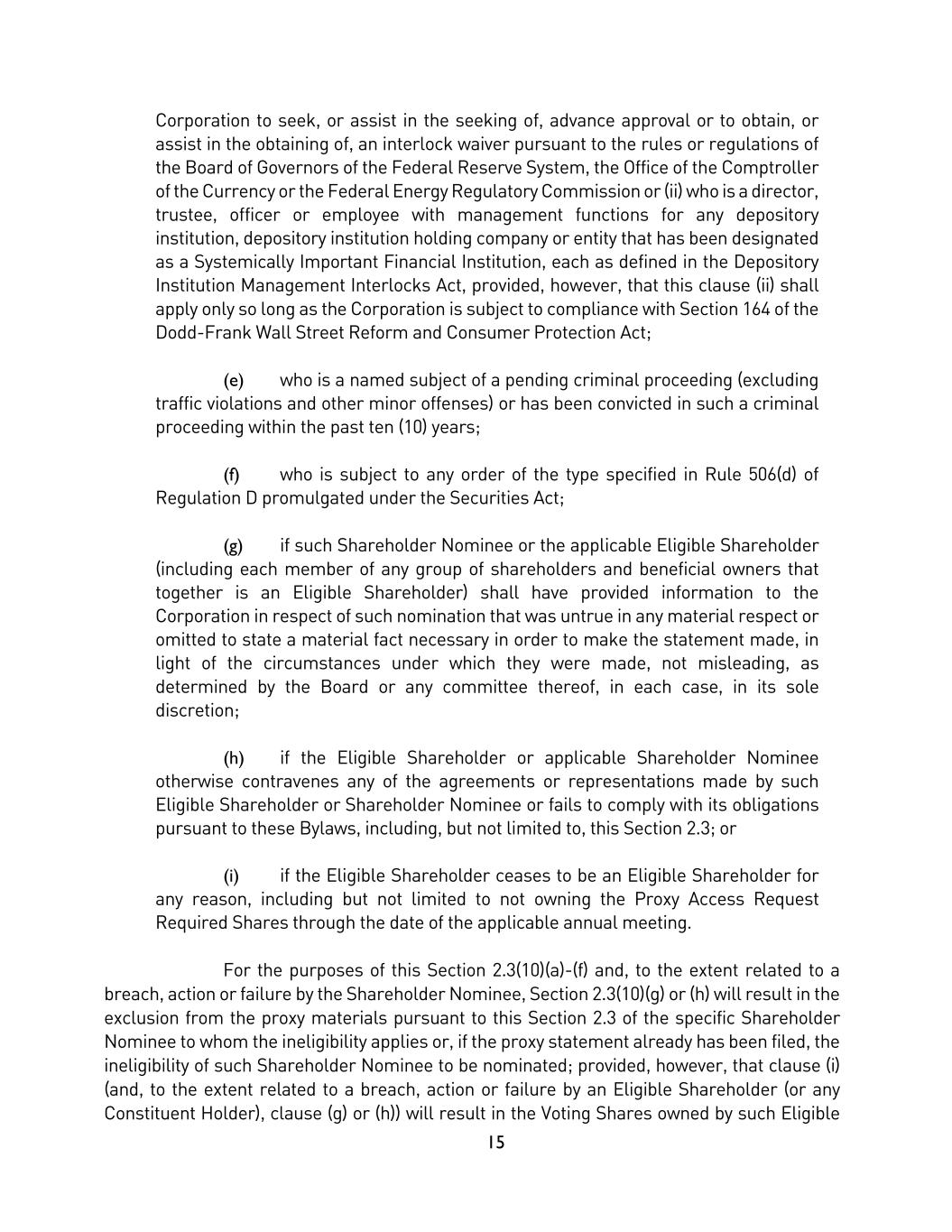
15 Corporation to seek, or assist in the seeking of, advance approval or to obtain, or assist in the obtaining of, an interlock waiver pursuant to the rules or regulations of the Board of Governors of the Federal Reserve System, the Office of the Comptroller of the Currency or the Federal Energy Regulatory Commission or (ii) who is a director, trustee, officer or employee with management functions for any depository institution, depository institution holding company or entity that has been designated as a Systemically Important Financial Institution, each as defined in the Depository Institution Management Interlocks Act, provided, however, that this clause (ii) shall apply only so long as the Corporation is subject to compliance with Section 164 of the Dodd-Frank Wall Street Reform and Consumer Protection Act; (e) who is a named subject of a pending criminal proceeding (excluding traffic violations and other minor offenses) or has been convicted in such a criminal proceeding within the past ten (10) years; (f) who is subject to any order of the type specified in Rule 506(d) of Regulation D promulgated under the Securities Act; (g) if such Shareholder Nominee or the applicable Eligible Shareholder (including each member of any group of shareholders and beneficial owners that together is an Eligible Shareholder) shall have provided information to the Corporation in respect of such nomination that was untrue in any material respect or omitted to state a material fact necessary in order to make the statement made, in light of the circumstances under which they were made, not misleading, as determined by the Board or any committee thereof, in each case, in its sole discretion; (h) if the Eligible Shareholder or applicable Shareholder Nominee otherwise contravenes any of the agreements or representations made by such Eligible Shareholder or Shareholder Nominee or fails to comply with its obligations pursuant to these Bylaws, including, but not limited to, this Section 2.3; or (i) if the Eligible Shareholder ceases to be an Eligible Shareholder for any reason, including but not limited to not owning the Proxy Access Request Required Shares through the date of the applicable annual meeting. For the purposes of this Section 2.3(10)(a)-(f) and, to the extent related to a breach, action or failure by the Shareholder Nominee, Section 2.3(10)(g) or (h) will result in the exclusion from the proxy materials pursuant to this Section 2.3 of the specific Shareholder Nominee to whom the ineligibility applies or, if the proxy statement already has been filed, the ineligibility of such Shareholder Nominee to be nominated; provided, however, that clause (i) (and, to the extent related to a breach, action or failure by an Eligible Shareholder (or any Constituent Holder), clause (g) or (h)) will result in the Voting Shares owned by such Eligible
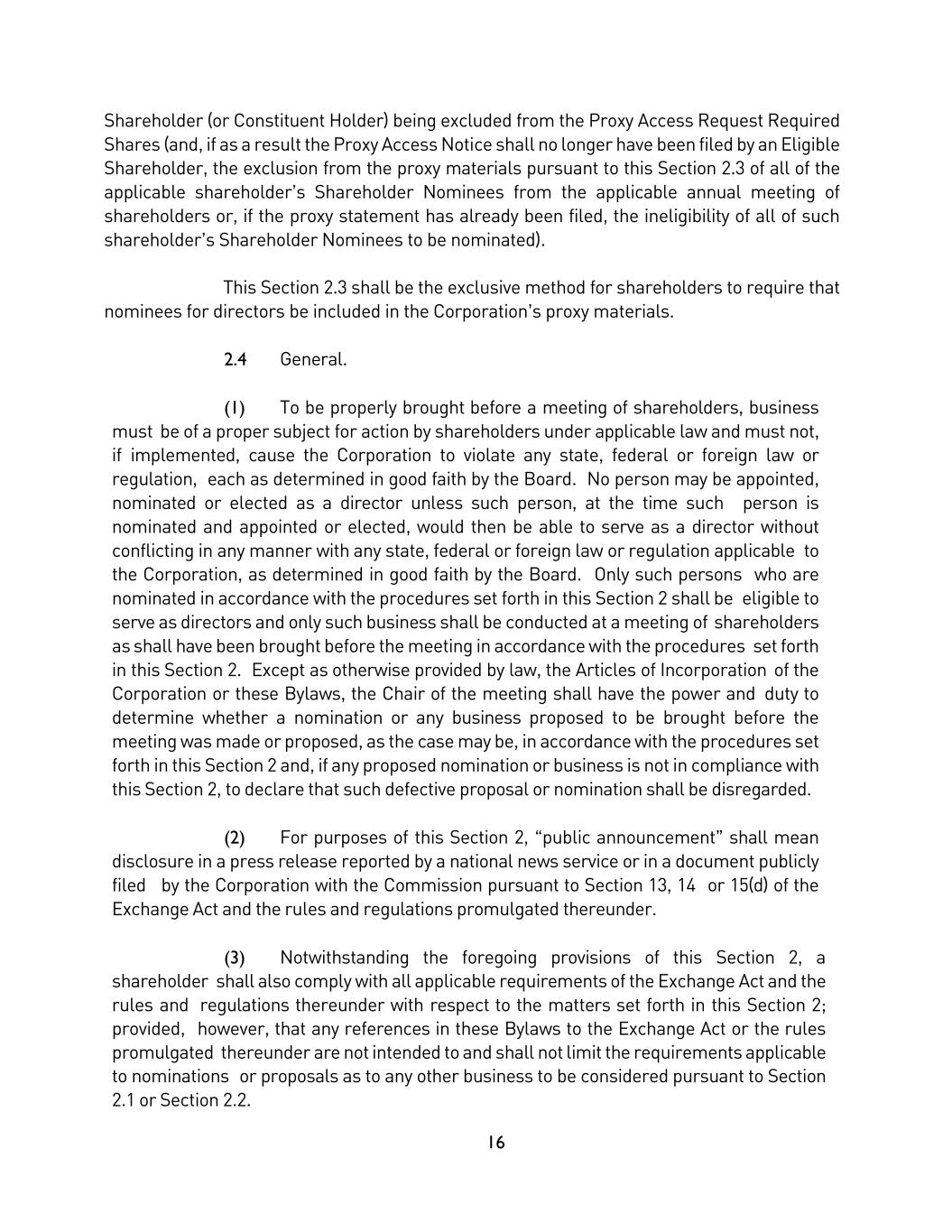
16 Shareholder (or Constituent Holder) being excluded from the Proxy Access Request Required Shares (and, if as a result the Proxy Access Notice shall no longer have been filed by an Eligible Shareholder, the exclusion from the proxy materials pursuant to this Section 2.3 of all of the applicable shareholder’s Shareholder Nominees from the applicable annual meeting of shareholders or, if the proxy statement has already been filed, the ineligibility of all of such shareholder’s Shareholder Nominees to be nominated). This Section 2.3 shall be the exclusive method for shareholders to require that nominees for directors be included in the Corporation’s proxy materials. 2.4 General. (1) To be properly brought before a meeting of shareholders, business must be of a proper subject for action by shareholders under applicable law and must not, if implemented, cause the Corporation to violate any state, federal or foreign law or regulation, each as determined in good faith by the Board. No person may be appointed, nominated or elected as a director unless such person, at the time such person is nominated and appointed or elected, would then be able to serve as a director without conflicting in any manner with any state, federal or foreign law or regulation applicable to the Corporation, as determined in good faith by the Board. Only such persons who are nominated in accordance with the procedures set forth in this Section 2 shall be eligible to serve as directors and only such business shall be conducted at a meeting of shareholders as shall have been brought before the meeting in accordance with the procedures set forth in this Section 2. Except as otherwise provided by law, the Articles of Incorporation of the Corporation or these Bylaws, the Chair of the meeting shall have the power and duty to determine whether a nomination or any business proposed to be brought before the meeting was made or proposed, as the case may be, in accordance with the procedures set forth in this Section 2 and, if any proposed nomination or business is not in compliance with this Section 2, to declare that such defective proposal or nomination shall be disregarded. (2) For purposes of this Section 2, “public announcement” shall mean disclosure in a press release reported by a national news service or in a document publicly filed by the Corporation with the Commission pursuant to Section 13, 14 or 15(d) of the Exchange Act and the rules and regulations promulgated thereunder. (3) Notwithstanding the foregoing provisions of this Section 2, a shareholder shall also comply with all applicable requirements of the Exchange Act and the rules and regulations thereunder with respect to the matters set forth in this Section 2; provided, however, that any references in these Bylaws to the Exchange Act or the rules promulgated thereunder are not intended to and shall not limit the requirements applicable to nominations or proposals as to any other business to be considered pursuant to Section 2.1 or Section 2.2.
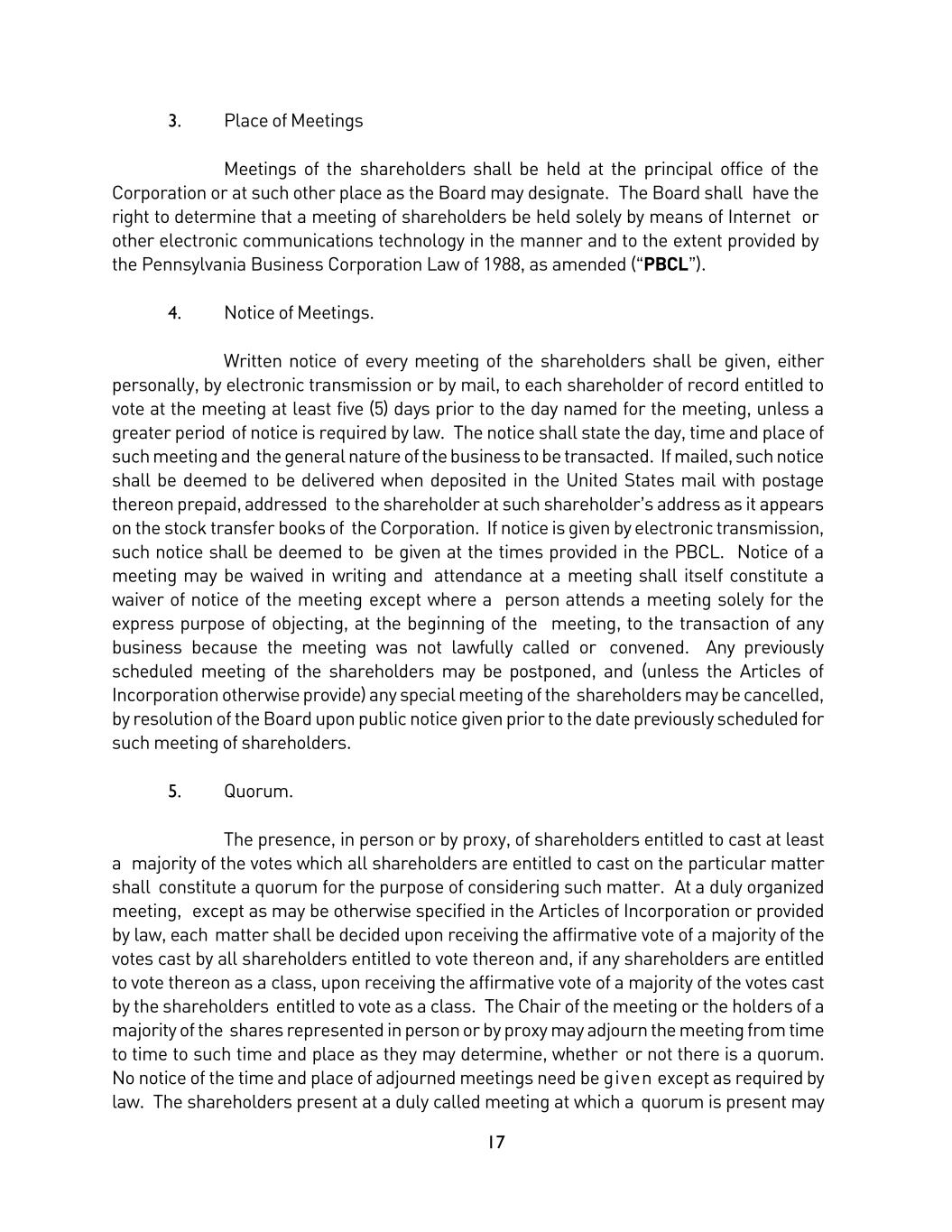
17 3. Place of Meetings Meetings of the shareholders shall be held at the principal office of the Corporation or at such other place as the Board may designate. The Board shall have the right to determine that a meeting of shareholders be held solely by means of Internet or other electronic communications technology in the manner and to the extent provided by the Pennsylvania Business Corporation Law of 1988, as amended (“PBCL”). 4. Notice of Meetings. Written notice of every meeting of the shareholders shall be given, either personally, by electronic transmission or by mail, to each shareholder of record entitled to vote at the meeting at least five (5) days prior to the day named for the meeting, unless a greater period of notice is required by law. The notice shall state the day, time and place of such meeting and the general nature of the business to be transacted. If mailed, such notice shall be deemed to be delivered when deposited in the United States mail with postage thereon prepaid, addressed to the shareholder at such shareholder’s address as it appears on the stock transfer books of the Corporation. If notice is given by electronic transmission, such notice shall be deemed to be given at the times provided in the PBCL. Notice of a meeting may be waived in writing and attendance at a meeting shall itself constitute a waiver of notice of the meeting except where a person attends a meeting solely for the express purpose of objecting, at the beginning of the meeting, to the transaction of any business because the meeting was not lawfully called or convened. Any previously scheduled meeting of the shareholders may be postponed, and (unless the Articles of Incorporation otherwise provide) any special meeting of the shareholders may be cancelled, by resolution of the Board upon public notice given prior to the date previously scheduled for such meeting of shareholders. 5. Quorum. The presence, in person or by proxy, of shareholders entitled to cast at least a majority of the votes which all shareholders are entitled to cast on the particular matter shall constitute a quorum for the purpose of considering such matter. At a duly organized meeting, except as may be otherwise specified in the Articles of Incorporation or provided by law, each matter shall be decided upon receiving the affirmative vote of a majority of the votes cast by all shareholders entitled to vote thereon and, if any shareholders are entitled to vote thereon as a class, upon receiving the affirmative vote of a majority of the votes cast by the shareholders entitled to vote as a class. The Chair of the meeting or the holders of a majority of the shares represented in person or by proxy may adjourn the meeting from time to time to such time and place as they may determine, whether or not there is a quorum. No notice of the time and place of adjourned meetings need be given except as required by law. The shareholders present at a duly called meeting at which a quorum is present may
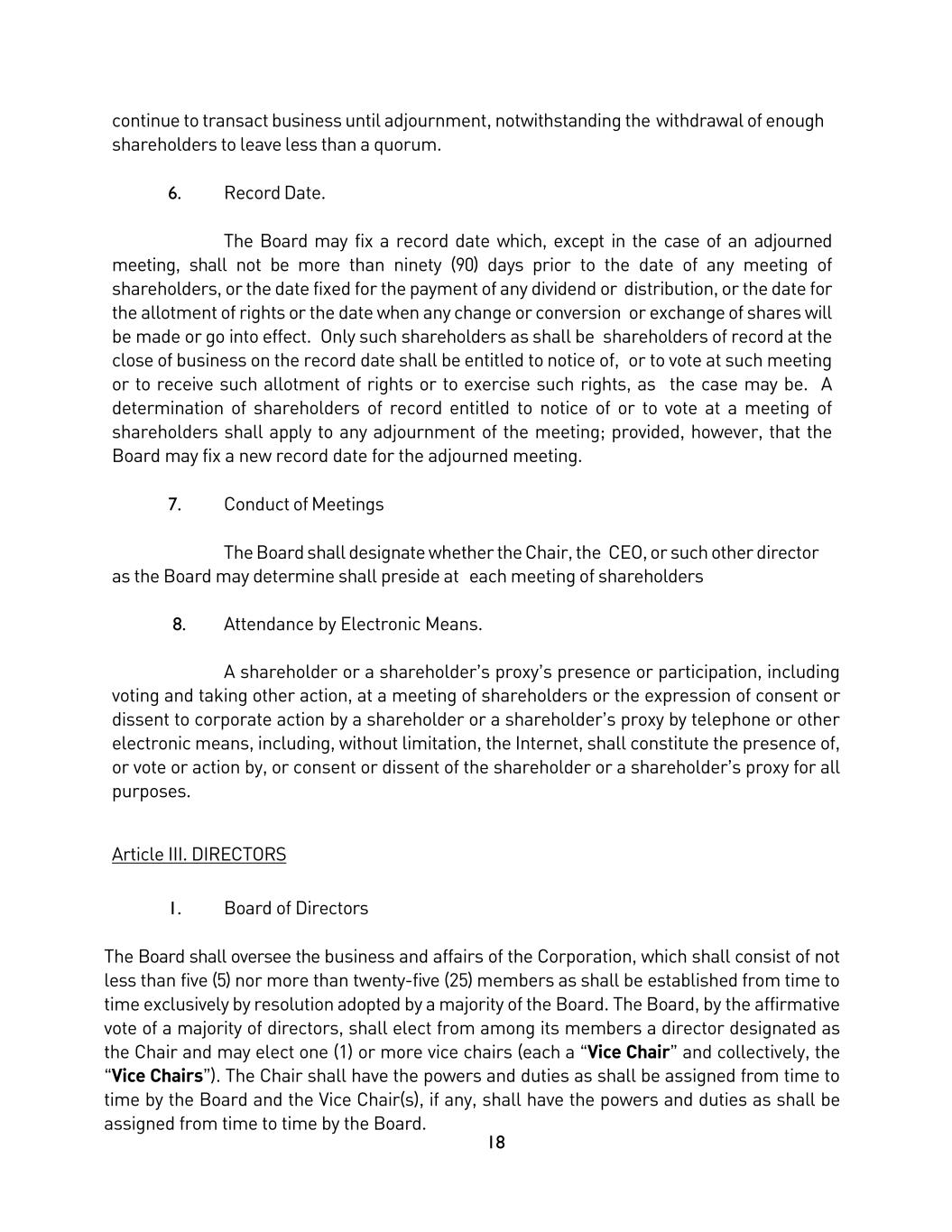
18 continue to transact business until adjournment, notwithstanding the withdrawal of enough shareholders to leave less than a quorum. 6. Record Date. The Board may fix a record date which, except in the case of an adjourned meeting, shall not be more than ninety (90) days prior to the date of any meeting of shareholders, or the date fixed for the payment of any dividend or distribution, or the date for the allotment of rights or the date when any change or conversion or exchange of shares will be made or go into effect. Only such shareholders as shall be shareholders of record at the close of business on the record date shall be entitled to notice of, or to vote at such meeting or to receive such allotment of rights or to exercise such rights, as the case may be. A determination of shareholders of record entitled to notice of or to vote at a meeting of shareholders shall apply to any adjournment of the meeting; provided, however, that the Board may fix a new record date for the adjourned meeting. 7. Conduct of Meetings The Board shall designate whether the Chair, the CEO, or such other director as the Board may determine shall preside at each meeting of shareholders 8. Attendance by Electronic Means. A shareholder or a shareholder’s proxy’s presence or participation, including voting and taking other action, at a meeting of shareholders or the expression of consent or dissent to corporate action by a shareholder or a shareholder’s proxy by telephone or other electronic means, including, without limitation, the Internet, shall constitute the presence of, or vote or action by, or consent or dissent of the shareholder or a shareholder’s proxy for all purposes. Article III. DIRECTORS 1. Board of Directors The Board shall oversee the business and affairs of the Corporation, which shall consist of not less than five (5) nor more than twenty-five (25) members as shall be established from time to time exclusively by resolution adopted by a majority of the Board. The Board, by the affirmative vote of a majority of directors, shall elect from among its members a director designated as the Chair and may elect one (1) or more vice chairs (each a “Vice Chair” and collectively, the “Vice Chairs”). The Chair shall have the powers and duties as shall be assigned from time to time by the Board and the Vice Chair(s), if any, shall have the powers and duties as shall be assigned from time to time by the Board.

19 2. Term of Office. After being elected by the shareholders, or by the directors pursuant to Article III, Section 3, directors shall hold office until the next annual meeting and until their successors shall have been elected and qualified or until such director’s earlier death, resignation, disqualification or removal. 3. Vacancy. Subject to applicable law and the rights of the holders of any series of the Corporation’s preferred stock with respect to such series of preferred stock, all vacancies in the Board, including vacancies resulting from an increase in the number of directors, may be filled by a majority vote of the remaining directors, even if less than a quorum. 4. Organization Meeting. As soon as practicable after the annual meeting of shareholders at which they were elected and without notice, the Board shall meet for the purpose of organizing the new board, electing officers and the transaction of such other business as may be properly brought before the meeting. 5. Regular Meetings. Regular meetings of the Board shall be held, without notice, at such times and at such places as the Board, by resolution, shall determine. 6. Special Meetings. Special meetings of the Board may be called by the Chair, the CEO or at the written request of a majority of the Board. Notice of special meetings shall be given to each director not later than during the day immediately preceding the day of such meeting and shall include the general nature of the business to be transacted at the meeting. A special meeting may be held at any time without notice if the directors who are present do not object at the start of the meeting to the lack of notice and those who are not present waive notice of the meeting in accordance with Article III, Section 10.2 hereof. 7. Quorum. A majority of the directors then in office shall constitute a quorum for the transaction of business, and the acts of a majority of the directors present at a meeting at which a quorum is present shall be the acts of the Board.
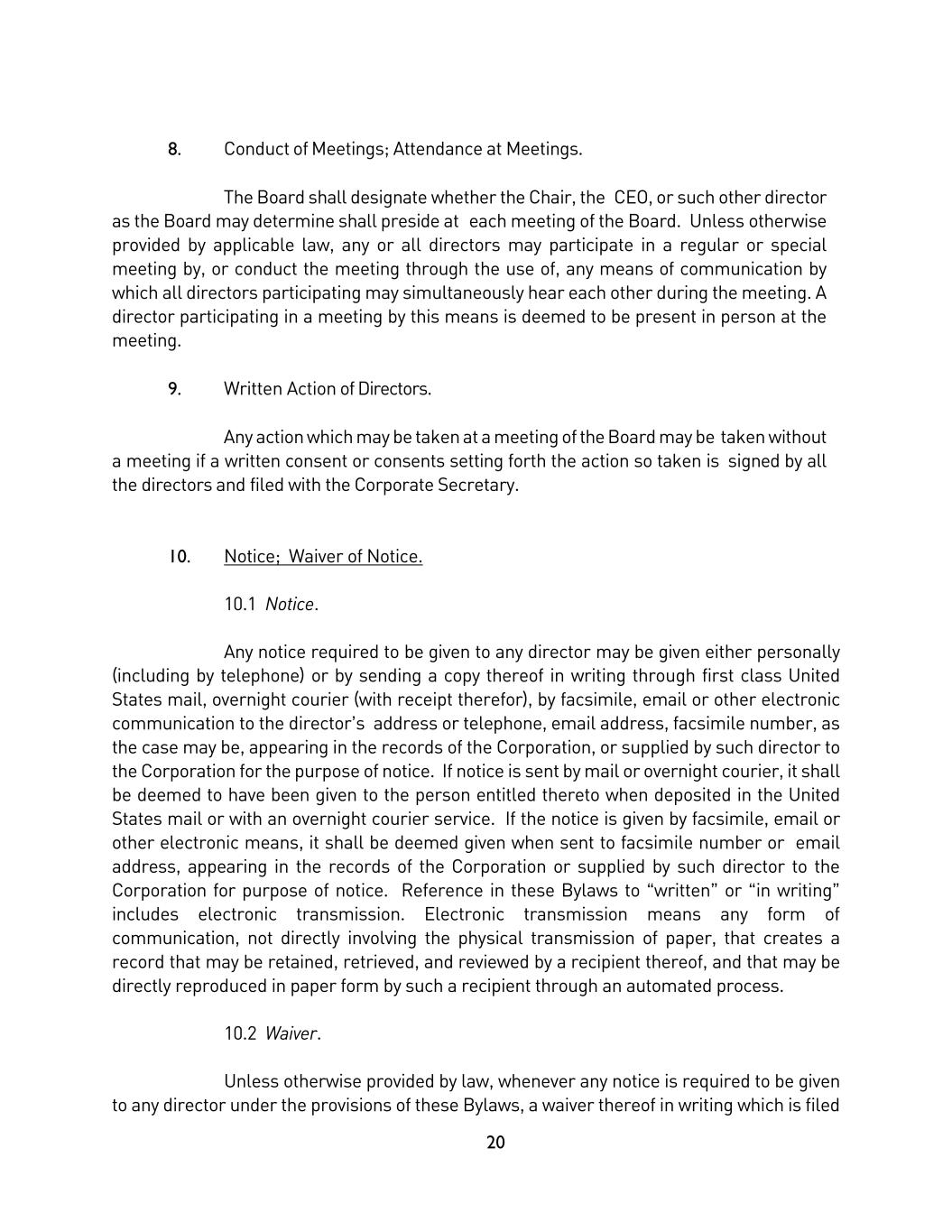
20 8. Conduct of Meetings; Attendance at Meetings. The Board shall designate whether the Chair, the CEO, or such other director as the Board may determine shall preside at each meeting of the Board. Unless otherwise provided by applicable law, any or all directors may participate in a regular or special meeting by, or conduct the meeting through the use of, any means of communication by which all directors participating may simultaneously hear each other during the meeting. A director participating in a meeting by this means is deemed to be present in person at the meeting. 9. Written Action of Directors. Any action which may be taken at a meeting of the Board may be taken without a meeting if a written consent or consents setting forth the action so taken is signed by all the directors and filed with the Corporate Secretary. 10. Notice; Waiver of Notice. 10.1 Notice. Any notice required to be given to any director may be given either personally (including by telephone) or by sending a copy thereof in writing through first class United States mail, overnight courier (with receipt therefor), by facsimile, email or other electronic communication to the director’s address or telephone, email address, facsimile number, as the case may be, appearing in the records of the Corporation, or supplied by such director to the Corporation for the purpose of notice. If notice is sent by mail or overnight courier, it shall be deemed to have been given to the person entitled thereto when deposited in the United States mail or with an overnight courier service. If the notice is given by facsimile, email or other electronic means, it shall be deemed given when sent to facsimile number or email address, appearing in the records of the Corporation or supplied by such director to the Corporation for purpose of notice. Reference in these Bylaws to “written” or “in writing” includes electronic transmission. Electronic transmission means any form of communication, not directly involving the physical transmission of paper, that creates a record that may be retained, retrieved, and reviewed by a recipient thereof, and that may be directly reproduced in paper form by such a recipient through an automated process. 10.2 Waiver. Unless otherwise provided by law, whenever any notice is required to be given to any director under the provisions of these Bylaws, a waiver thereof in writing which is filed
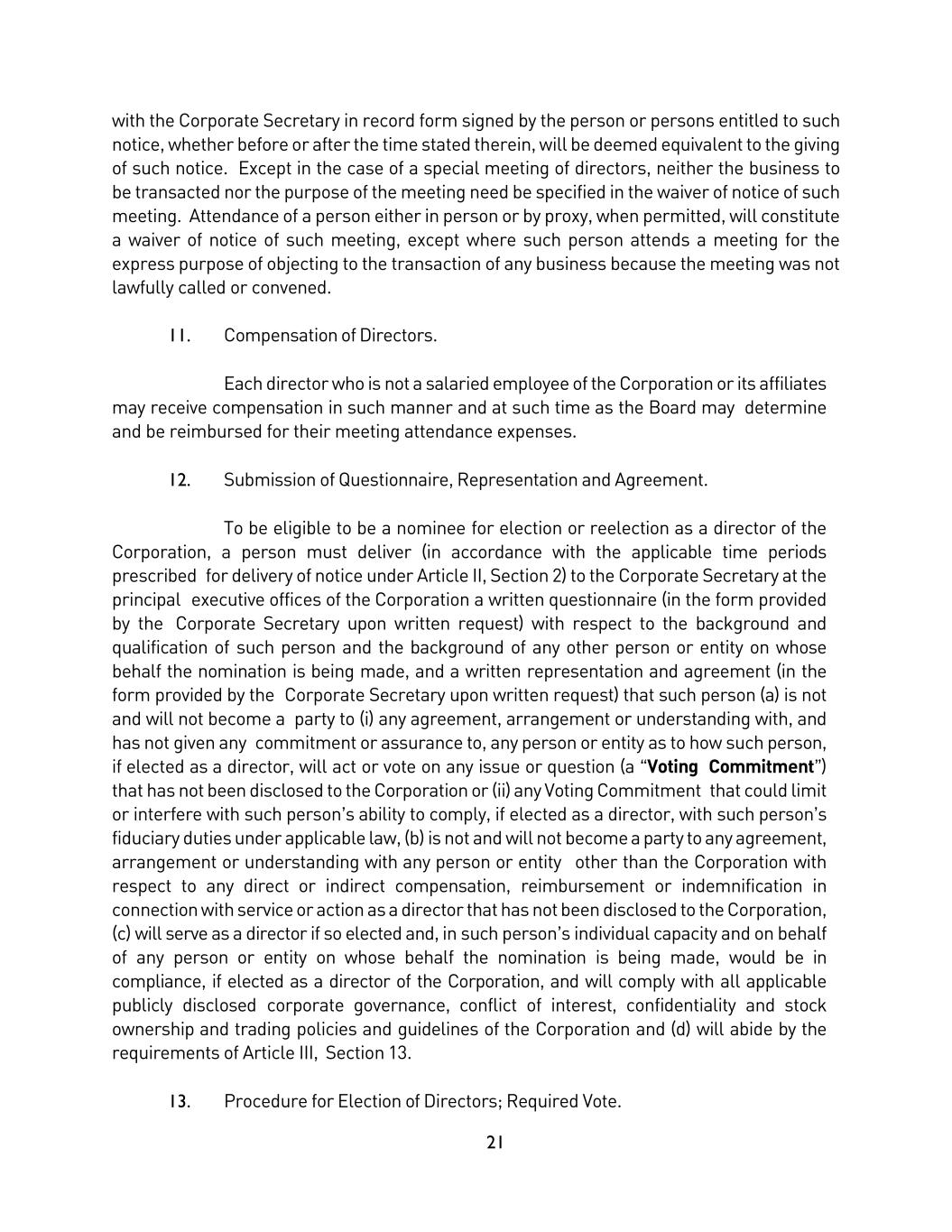
21 with the Corporate Secretary in record form signed by the person or persons entitled to such notice, whether before or after the time stated therein, will be deemed equivalent to the giving of such notice. Except in the case of a special meeting of directors, neither the business to be transacted nor the purpose of the meeting need be specified in the waiver of notice of such meeting. Attendance of a person either in person or by proxy, when permitted, will constitute a waiver of notice of such meeting, except where such person attends a meeting for the express purpose of objecting to the transaction of any business because the meeting was not lawfully called or convened. 11. Compensation of Directors. Each director who is not a salaried employee of the Corporation or its affiliates may receive compensation in such manner and at such time as the Board may determine and be reimbursed for their meeting attendance expenses. 12. Submission of Questionnaire, Representation and Agreement. To be eligible to be a nominee for election or reelection as a director of the Corporation, a person must deliver (in accordance with the applicable time periods prescribed for delivery of notice under Article II, Section 2) to the Corporate Secretary at the principal executive offices of the Corporation a written questionnaire (in the form provided by the Corporate Secretary upon written request) with respect to the background and qualification of such person and the background of any other person or entity on whose behalf the nomination is being made, and a written representation and agreement (in the form provided by the Corporate Secretary upon written request) that such person (a) is not and will not become a party to (i) any agreement, arrangement or understanding with, and has not given any commitment or assurance to, any person or entity as to how such person, if elected as a director, will act or vote on any issue or question (a “Voting Commitment”) that has not been disclosed to the Corporation or (ii) any Voting Commitment that could limit or interfere with such person’s ability to comply, if elected as a director, with such person’s fiduciary duties under applicable law, (b) is not and will not become a party to any agreement, arrangement or understanding with any person or entity other than the Corporation with respect to any direct or indirect compensation, reimbursement or indemnification in connection with service or action as a director that has not been disclosed to the Corporation, (c) will serve as a director if so elected and, in such person’s individual capacity and on behalf of any person or entity on whose behalf the nomination is being made, would be in compliance, if elected as a director of the Corporation, and will comply with all applicable publicly disclosed corporate governance, conflict of interest, confidentiality and stock ownership and trading policies and guidelines of the Corporation and (d) will abide by the requirements of Article III, Section 13. 13. Procedure for Election of Directors; Required Vote.
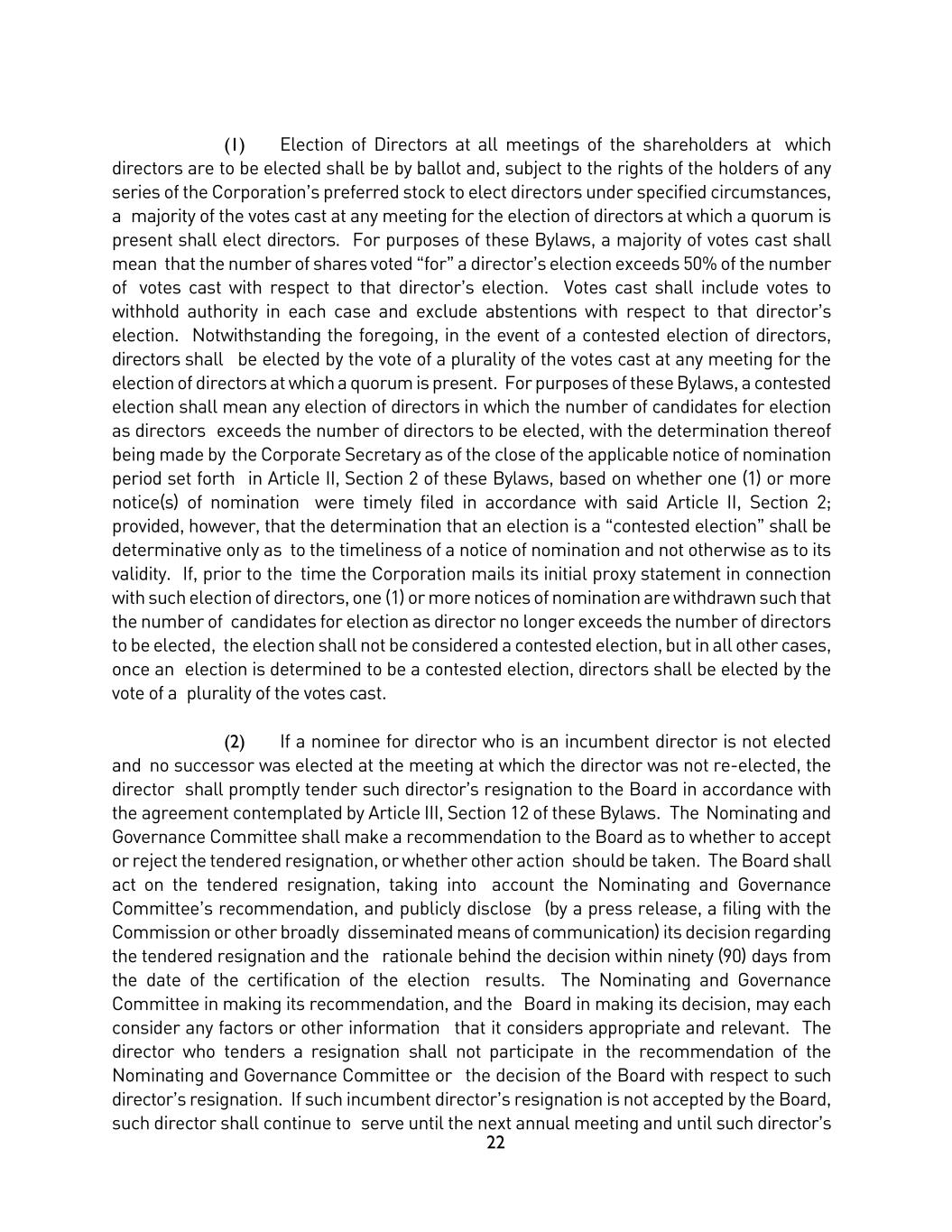
22 (1) Election of Directors at all meetings of the shareholders at which directors are to be elected shall be by ballot and, subject to the rights of the holders of any series of the Corporation’s preferred stock to elect directors under specified circumstances, a majority of the votes cast at any meeting for the election of directors at which a quorum is present shall elect directors. For purposes of these Bylaws, a majority of votes cast shall mean that the number of shares voted “for” a director’s election exceeds 50% of the number of votes cast with respect to that director’s election. Votes cast shall include votes to withhold authority in each case and exclude abstentions with respect to that director’s election. Notwithstanding the foregoing, in the event of a contested election of directors, directors shall be elected by the vote of a plurality of the votes cast at any meeting for the election of directors at which a quorum is present. For purposes of these Bylaws, a contested election shall mean any election of directors in which the number of candidates for election as directors exceeds the number of directors to be elected, with the determination thereof being made by the Corporate Secretary as of the close of the applicable notice of nomination period set forth in Article II, Section 2 of these Bylaws, based on whether one (1) or more notice(s) of nomination were timely filed in accordance with said Article II, Section 2; provided, however, that the determination that an election is a “contested election” shall be determinative only as to the timeliness of a notice of nomination and not otherwise as to its validity. If, prior to the time the Corporation mails its initial proxy statement in connection with such election of directors, one (1) or more notices of nomination are withdrawn such that the number of candidates for election as director no longer exceeds the number of directors to be elected, the election shall not be considered a contested election, but in all other cases, once an election is determined to be a contested election, directors shall be elected by the vote of a plurality of the votes cast. (2) If a nominee for director who is an incumbent director is not elected and no successor was elected at the meeting at which the director was not re-elected, the director shall promptly tender such director’s resignation to the Board in accordance with the agreement contemplated by Article III, Section 12 of these Bylaws. The Nominating and Governance Committee shall make a recommendation to the Board as to whether to accept or reject the tendered resignation, or whether other action should be taken. The Board shall act on the tendered resignation, taking into account the Nominating and Governance Committee’s recommendation, and publicly disclose (by a press release, a filing with the Commission or other broadly disseminated means of communication) its decision regarding the tendered resignation and the rationale behind the decision within ninety (90) days from the date of the certification of the election results. The Nominating and Governance Committee in making its recommendation, and the Board in making its decision, may each consider any factors or other information that it considers appropriate and relevant. The director who tenders a resignation shall not participate in the recommendation of the Nominating and Governance Committee or the decision of the Board with respect to such director’s resignation. If such incumbent director’s resignation is not accepted by the Board, such director shall continue to serve until the next annual meeting and until such director’s
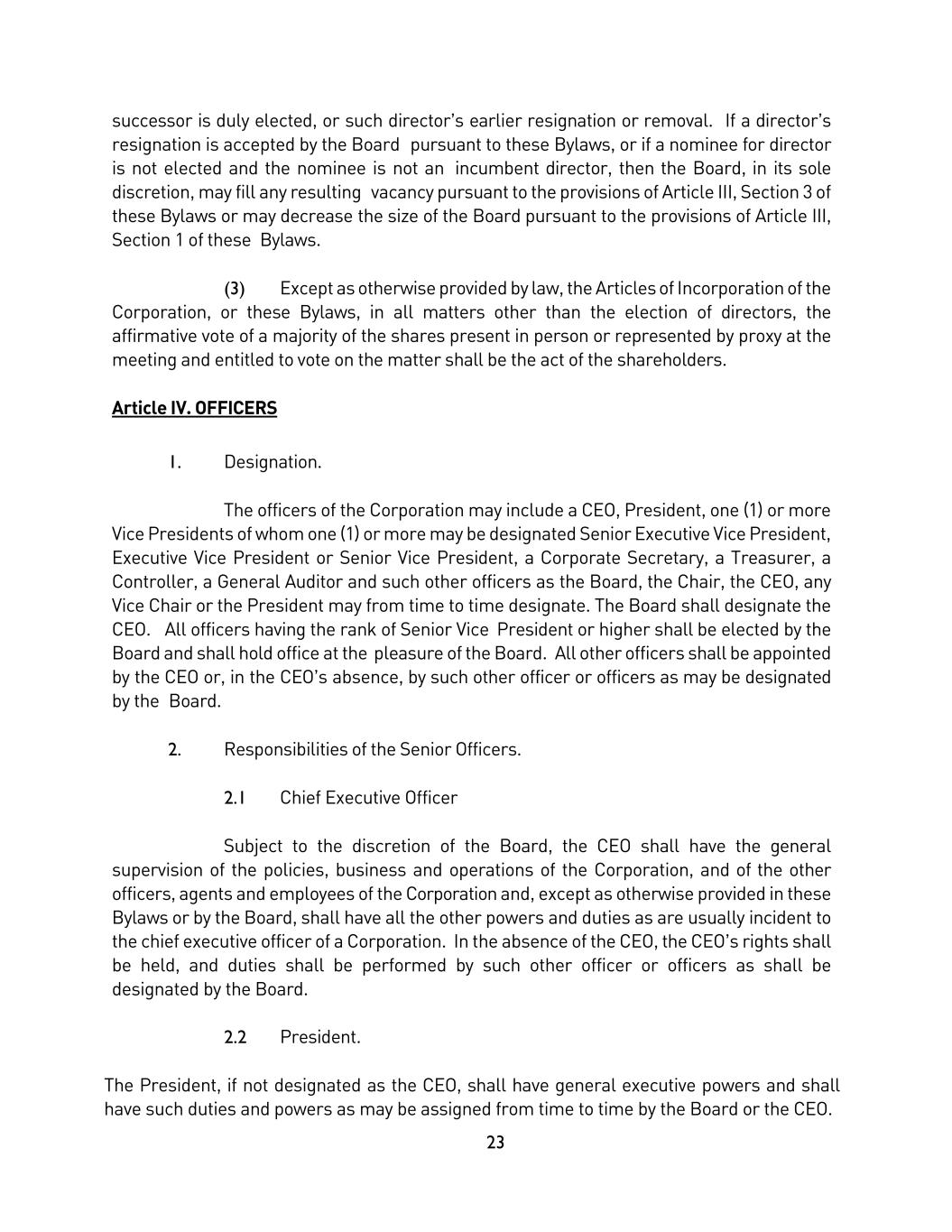
23 successor is duly elected, or such director’s earlier resignation or removal. If a director’s resignation is accepted by the Board pursuant to these Bylaws, or if a nominee for director is not elected and the nominee is not an incumbent director, then the Board, in its sole discretion, may fill any resulting vacancy pursuant to the provisions of Article III, Section 3 of these Bylaws or may decrease the size of the Board pursuant to the provisions of Article III, Section 1 of these Bylaws. (3) Except as otherwise provided by law, the Articles of Incorporation of the Corporation, or these Bylaws, in all matters other than the election of directors, the affirmative vote of a majority of the shares present in person or represented by proxy at the meeting and entitled to vote on the matter shall be the act of the shareholders. Article IV. OFFICERS 1. Designation. The officers of the Corporation may include a CEO, President, one (1) or more Vice Presidents of whom one (1) or more may be designated Senior Executive Vice President, Executive Vice President or Senior Vice President, a Corporate Secretary, a Treasurer, a Controller, a General Auditor and such other officers as the Board, the Chair, the CEO, any Vice Chair or the President may from time to time designate. The Board shall designate the CEO. All officers having the rank of Senior Vice President or higher shall be elected by the Board and shall hold office at the pleasure of the Board. All other officers shall be appointed by the CEO or, in the CEO’s absence, by such other officer or officers as may be designated by the Board. 2. Responsibilities of the Senior Officers. 2.1 Chief Executive Officer Subject to the discretion of the Board, the CEO shall have the general supervision of the policies, business and operations of the Corporation, and of the other officers, agents and employees of the Corporation and, except as otherwise provided in these Bylaws or by the Board, shall have all the other powers and duties as are usually incident to the chief executive officer of a Corporation. In the absence of the CEO, the CEO’s rights shall be held, and duties shall be performed by such other officer or officers as shall be designated by the Board. 2.2 President. The President, if not designated as the CEO, shall have general executive powers and shall have such duties and powers as may be assigned from time to time by the Board or the CEO.
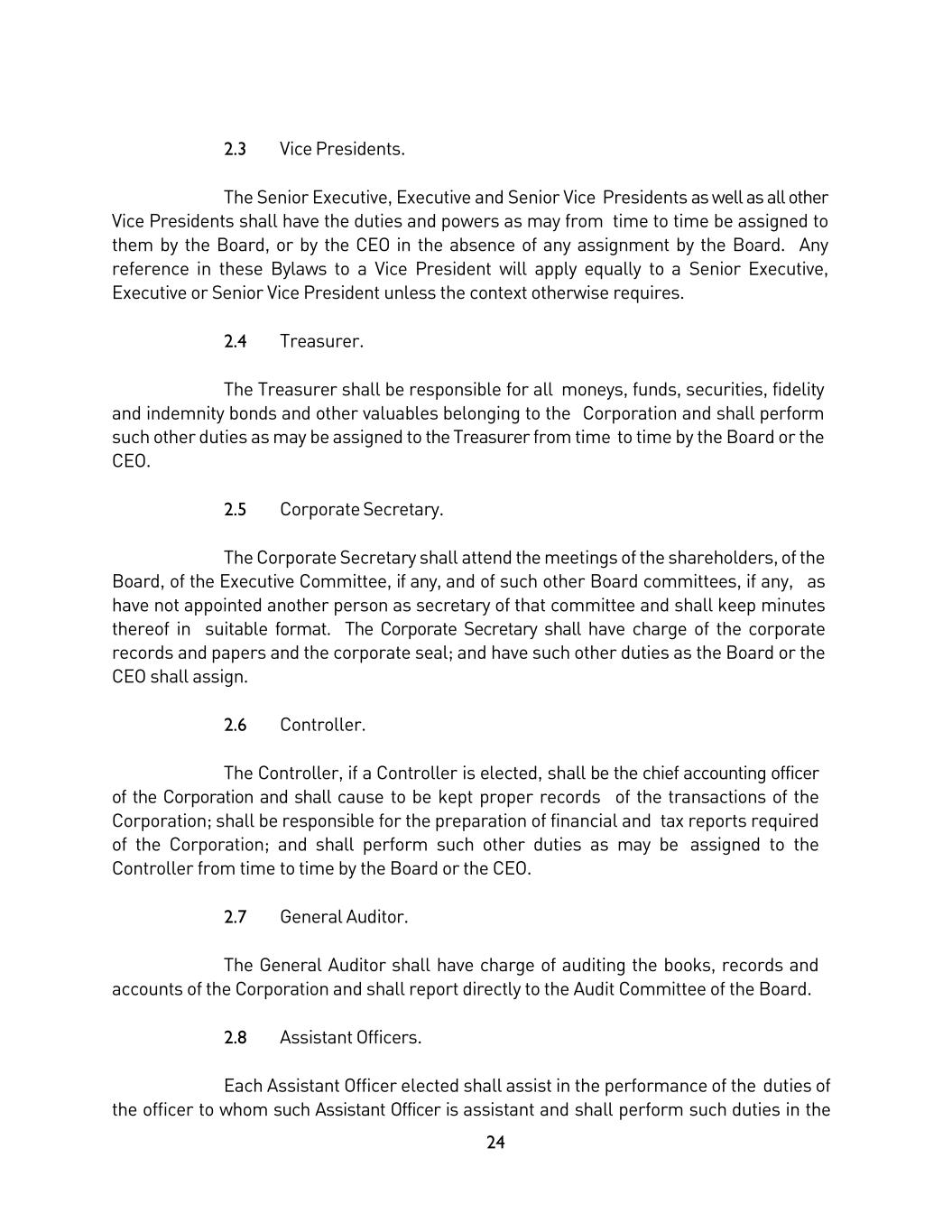
24 2.3 Vice Presidents. The Senior Executive, Executive and Senior Vice Presidents as well as all other Vice Presidents shall have the duties and powers as may from time to time be assigned to them by the Board, or by the CEO in the absence of any assignment by the Board. Any reference in these Bylaws to a Vice President will apply equally to a Senior Executive, Executive or Senior Vice President unless the context otherwise requires. 2.4 Treasurer. The Treasurer shall be responsible for all moneys, funds, securities, fidelity and indemnity bonds and other valuables belonging to the Corporation and shall perform such other duties as may be assigned to the Treasurer from time to time by the Board or the CEO. 2.5 Corporate Secretary. The Corporate Secretary shall attend the meetings of the shareholders, of the Board, of the Executive Committee, if any, and of such other Board committees, if any, as have not appointed another person as secretary of that committee and shall keep minutes thereof in suitable format. The Corporate Secretary shall have charge of the corporate records and papers and the corporate seal; and have such other duties as the Board or the CEO shall assign. 2.6 Controller. The Controller, if a Controller is elected, shall be the chief accounting officer of the Corporation and shall cause to be kept proper records of the transactions of the Corporation; shall be responsible for the preparation of financial and tax reports required of the Corporation; and shall perform such other duties as may be assigned to the Controller from time to time by the Board or the CEO. 2.7 General Auditor. The General Auditor shall have charge of auditing the books, records and accounts of the Corporation and shall report directly to the Audit Committee of the Board. 2.8 Assistant Officers. Each Assistant Officer elected shall assist in the performance of the duties of the officer to whom such Assistant Officer is assistant and shall perform such duties in the
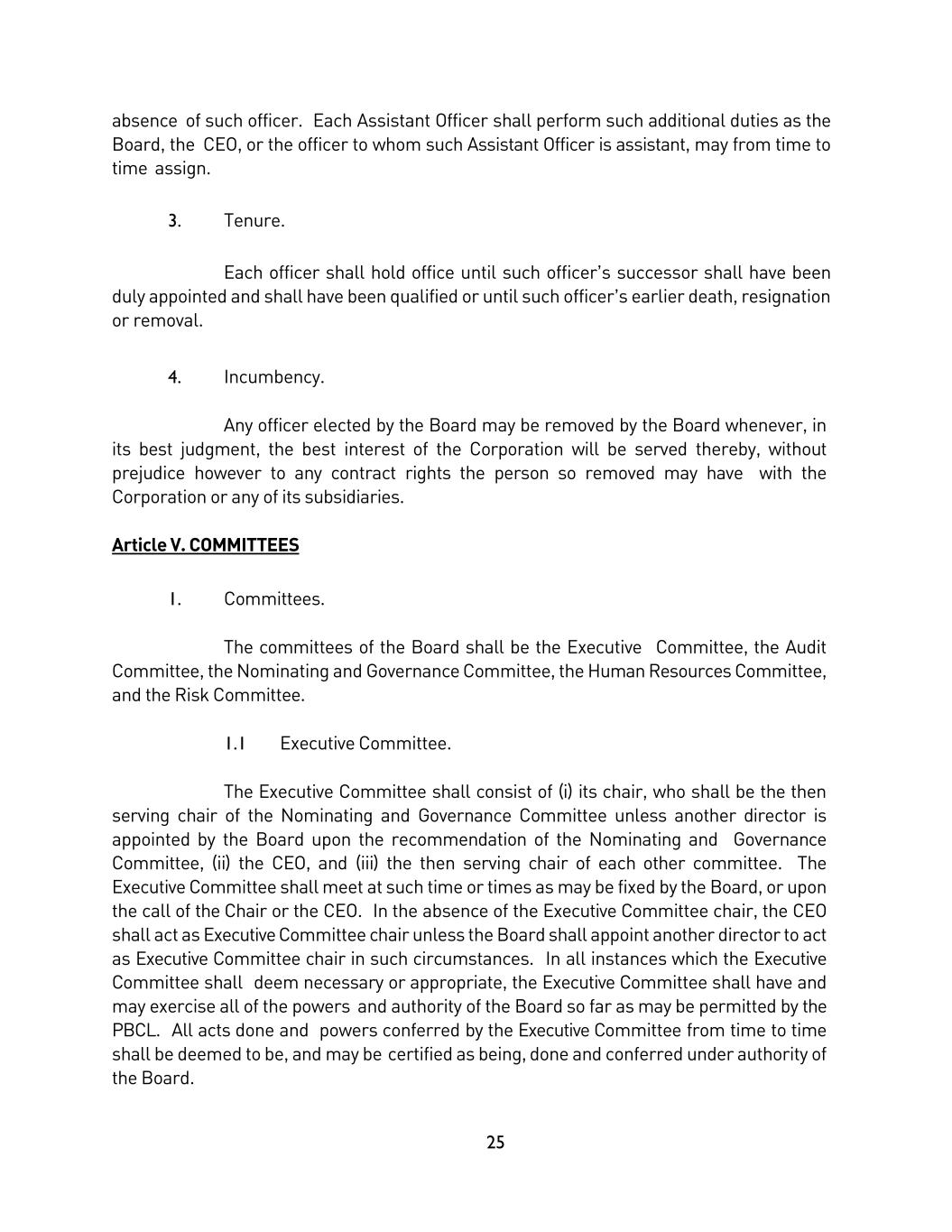
25 absence of such officer. Each Assistant Officer shall perform such additional duties as the Board, the CEO, or the officer to whom such Assistant Officer is assistant, may from time to time assign. 3. Tenure. Each officer shall hold office until such officer’s successor shall have been duly appointed and shall have been qualified or until such officer’s earlier death, resignation or removal. 4. Incumbency. Any officer elected by the Board may be removed by the Board whenever, in its best judgment, the best interest of the Corporation will be served thereby, without prejudice however to any contract rights the person so removed may have with the Corporation or any of its subsidiaries. Article V. COMMITTEES 1. Committees. The committees of the Board shall be the Executive Committee, the Audit Committee, the Nominating and Governance Committee, the Human Resources Committee, and the Risk Committee. 1.1 Executive Committee. The Executive Committee shall consist of (i) its chair, who shall be the then serving chair of the Nominating and Governance Committee unless another director is appointed by the Board upon the recommendation of the Nominating and Governance Committee, (ii) the CEO, and (iii) the then serving chair of each other committee. The Executive Committee shall meet at such time or times as may be fixed by the Board, or upon the call of the Chair or the CEO. In the absence of the Executive Committee chair, the CEO shall act as Executive Committee chair unless the Board shall appoint another director to act as Executive Committee chair in such circumstances. In all instances which the Executive Committee shall deem necessary or appropriate, the Executive Committee shall have and may exercise all of the powers and authority of the Board so far as may be permitted by the PBCL. All acts done and powers conferred by the Executive Committee from time to time shall be deemed to be, and may be certified as being, done and conferred under authority of the Board.
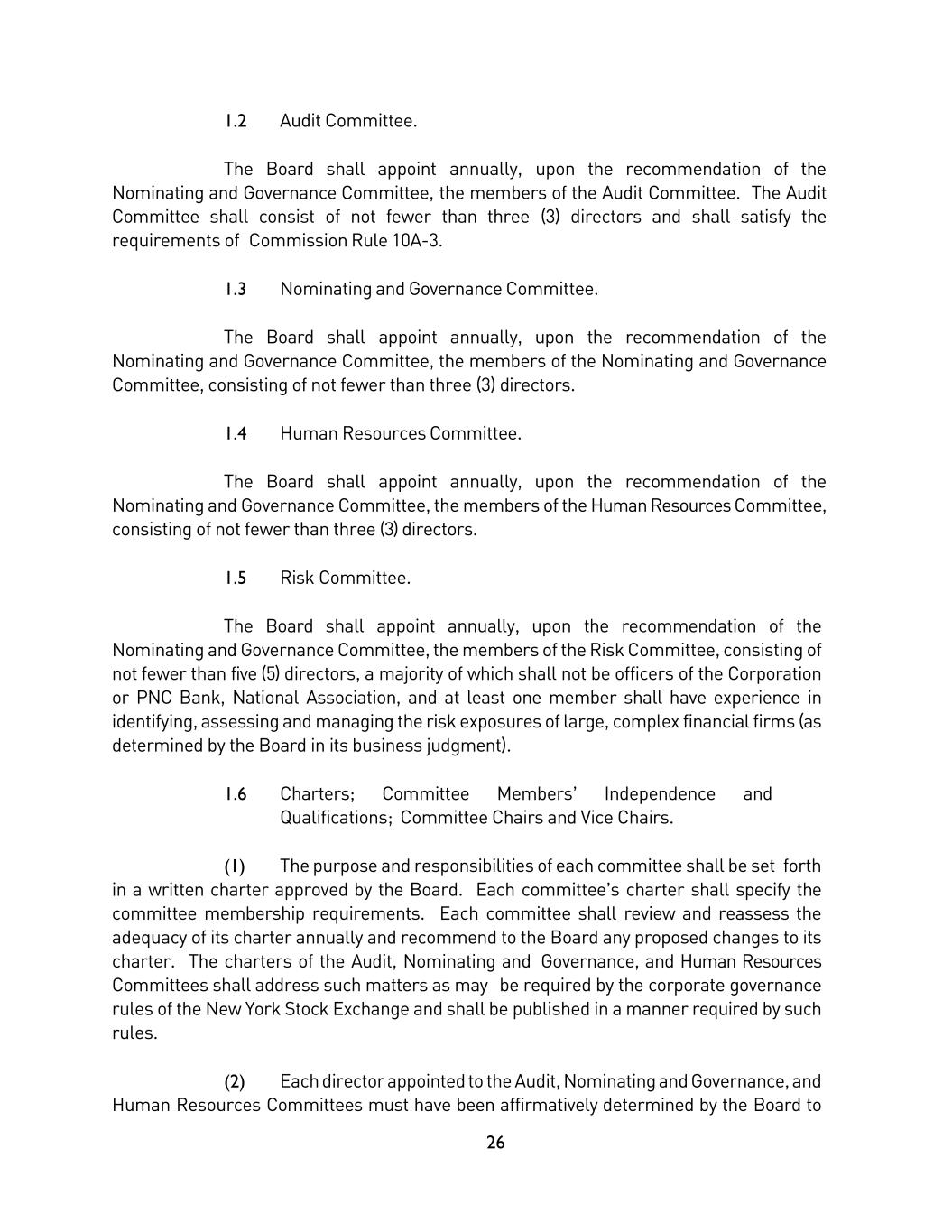
26 1.2 Audit Committee. The Board shall appoint annually, upon the recommendation of the Nominating and Governance Committee, the members of the Audit Committee. The Audit Committee shall consist of not fewer than three (3) directors and shall satisfy the requirements of Commission Rule 10A-3. 1.3 Nominating and Governance Committee. The Board shall appoint annually, upon the recommendation of the Nominating and Governance Committee, the members of the Nominating and Governance Committee, consisting of not fewer than three (3) directors. 1.4 Human Resources Committee. The Board shall appoint annually, upon the recommendation of the Nominating and Governance Committee, the members of the Human Resources Committee, consisting of not fewer than three (3) directors. 1.5 Risk Committee. The Board shall appoint annually, upon the recommendation of the Nominating and Governance Committee, the members of the Risk Committee, consisting of not fewer than five (5) directors, a majority of which shall not be officers of the Corporation or PNC Bank, National Association, and at least one member shall have experience in identifying, assessing and managing the risk exposures of large, complex financial firms (as determined by the Board in its business judgment). 1.6 Charters; Committee Members’ Independence and Qualifications; Committee Chairs and Vice Chairs. (1) The purpose and responsibilities of each committee shall be set forth in a written charter approved by the Board. Each committee’s charter shall specify the committee membership requirements. Each committee shall review and reassess the adequacy of its charter annually and recommend to the Board any proposed changes to its charter. The charters of the Audit, Nominating and Governance, and Human Resources Committees shall address such matters as may be required by the corporate governance rules of the New York Stock Exchange and shall be published in a manner required by such rules. (2) Each director appointed to the Audit, Nominating and Governance, and Human Resources Committees must have been affirmatively determined by the Board to
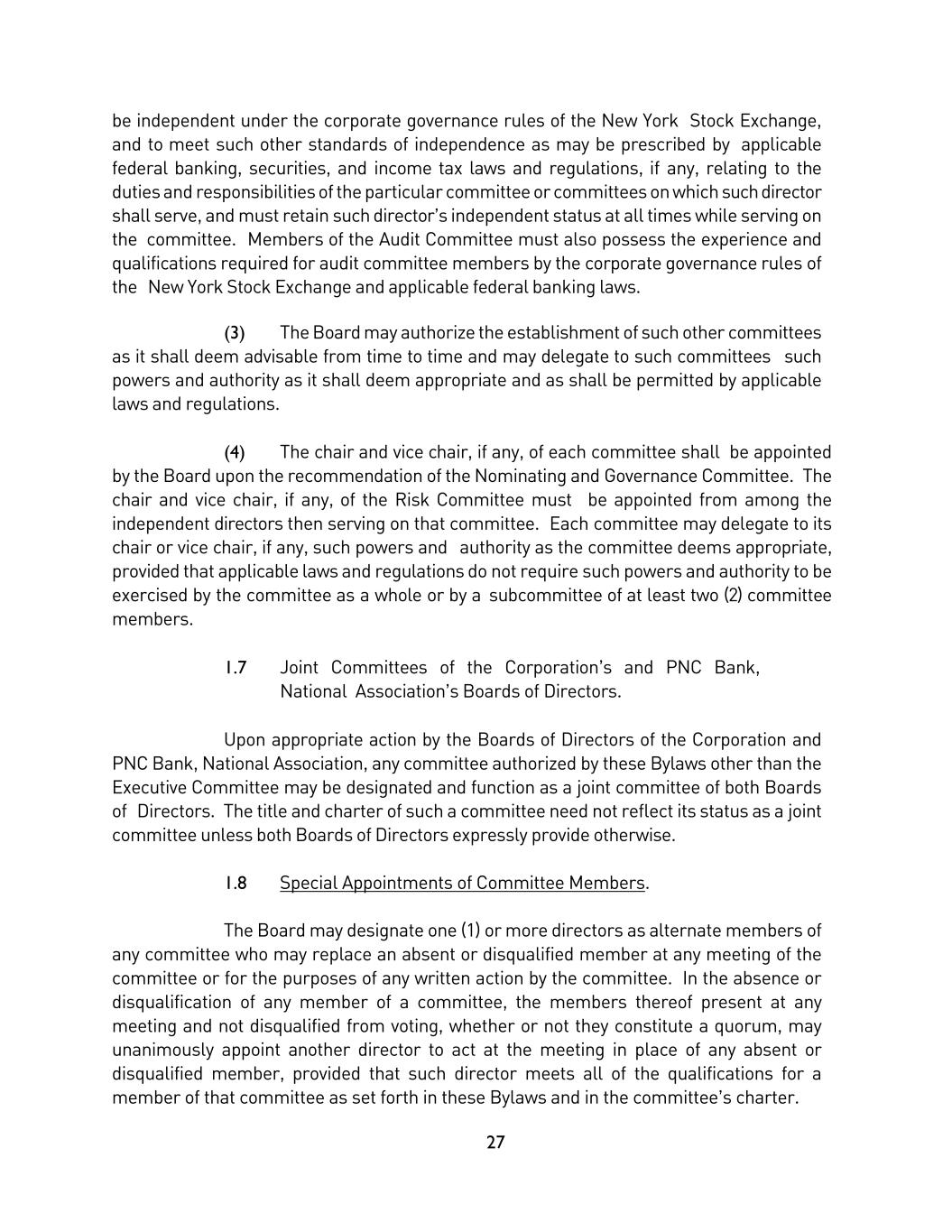
27 be independent under the corporate governance rules of the New York Stock Exchange, and to meet such other standards of independence as may be prescribed by applicable federal banking, securities, and income tax laws and regulations, if any, relating to the duties and responsibilities of the particular committee or committees on which such director shall serve, and must retain such director’s independent status at all times while serving on the committee. Members of the Audit Committee must also possess the experience and qualifications required for audit committee members by the corporate governance rules of the New York Stock Exchange and applicable federal banking laws. (3) The Board may authorize the establishment of such other committees as it shall deem advisable from time to time and may delegate to such committees such powers and authority as it shall deem appropriate and as shall be permitted by applicable laws and regulations. (4) The chair and vice chair, if any, of each committee shall be appointed by the Board upon the recommendation of the Nominating and Governance Committee. The chair and vice chair, if any, of the Risk Committee must be appointed from among the independent directors then serving on that committee. Each committee may delegate to its chair or vice chair, if any, such powers and authority as the committee deems appropriate, provided that applicable laws and regulations do not require such powers and authority to be exercised by the committee as a whole or by a subcommittee of at least two (2) committee members. 1.7 Joint Committees of the Corporation’s and PNC Bank, National Association’s Boards of Directors. Upon appropriate action by the Boards of Directors of the Corporation and PNC Bank, National Association, any committee authorized by these Bylaws other than the Executive Committee may be designated and function as a joint committee of both Boards of Directors. The title and charter of such a committee need not reflect its status as a joint committee unless both Boards of Directors expressly provide otherwise. 1.8 Special Appointments of Committee Members. The Board may designate one (1) or more directors as alternate members of any committee who may replace an absent or disqualified member at any meeting of the committee or for the purposes of any written action by the committee. In the absence or disqualification of any member of a committee, the members thereof present at any meeting and not disqualified from voting, whether or not they constitute a quorum, may unanimously appoint another director to act at the meeting in place of any absent or disqualified member, provided that such director meets all of the qualifications for a member of that committee as set forth in these Bylaws and in the committee’s charter.

28 2. Minutes. Minutes of the Executive Committee shall be submitted at a regular meeting of the Board, and any action taken by the Board with respect to the Executive Committee minutes shall be entered in the minutes of the Board. All other committees shall keep minutes of their meetings which shall be accessible to inspection by the Board at all times. 3. Rules of Procedure. Except as otherwise expressly provided for herein or in the committee’s charter, each committee may appoint a secretary, who need not be a director, adopt its own rules of procedure and, unless the Board has acted with respect thereto, determine the date, place and hour for its meetings. The Committee chair or vice chair, if any, may call a special meeting or reschedule a regular meeting if they deem it appropriate. In the absence of any other provision in these Bylaws or in the committee’s charter to the contrary, a majority of the members of any committee shall constitute a quorum, and the action of a majority of the members in attendance at a committee meeting shall constitute the action of that committee. Notice of meetings shall be given to each committee on or before the day preceding the meeting. Any action which may be taken at a meeting of a committee or subcommittee may be taken without a meeting if a written consent setting forth the action so taken is signed by all members of that committee or subcommittee and filed with the Corporate Secretary. Article VI. STOCK CERTIFICATES 1. Certificated and Uncertificated Stock. (1) The interest of each shareholder of the Corporation may be uncertificated or may be evidenced by certificates for shares of stock in such form as the appropriate officers of the Corporation may from time to time prescribe. (2) If shares of the Corporation’s stock are certificated, such certificates may be signed manually, by facsimile or electronically by the Chair, the CEO, the President, any Vice Chair, or any Vice President and shall be countersigned by the Corporate Secretary, the Treasurer, or any Assistant Corporate Secretary or Assistant Treasurer, and shall be sealed with the seal of the Corporation, which may be by facsimile or electronically. If the Board has designated a transfer agent, the transfer agent may countersign the certificate manually, by facsimile or electronically. The Board may designate a registrar to register each certificate that is issued manually, by use of a facsimile signature or electronically. (3) At all times that the Corporation’s stock is listed on a stock exchange,
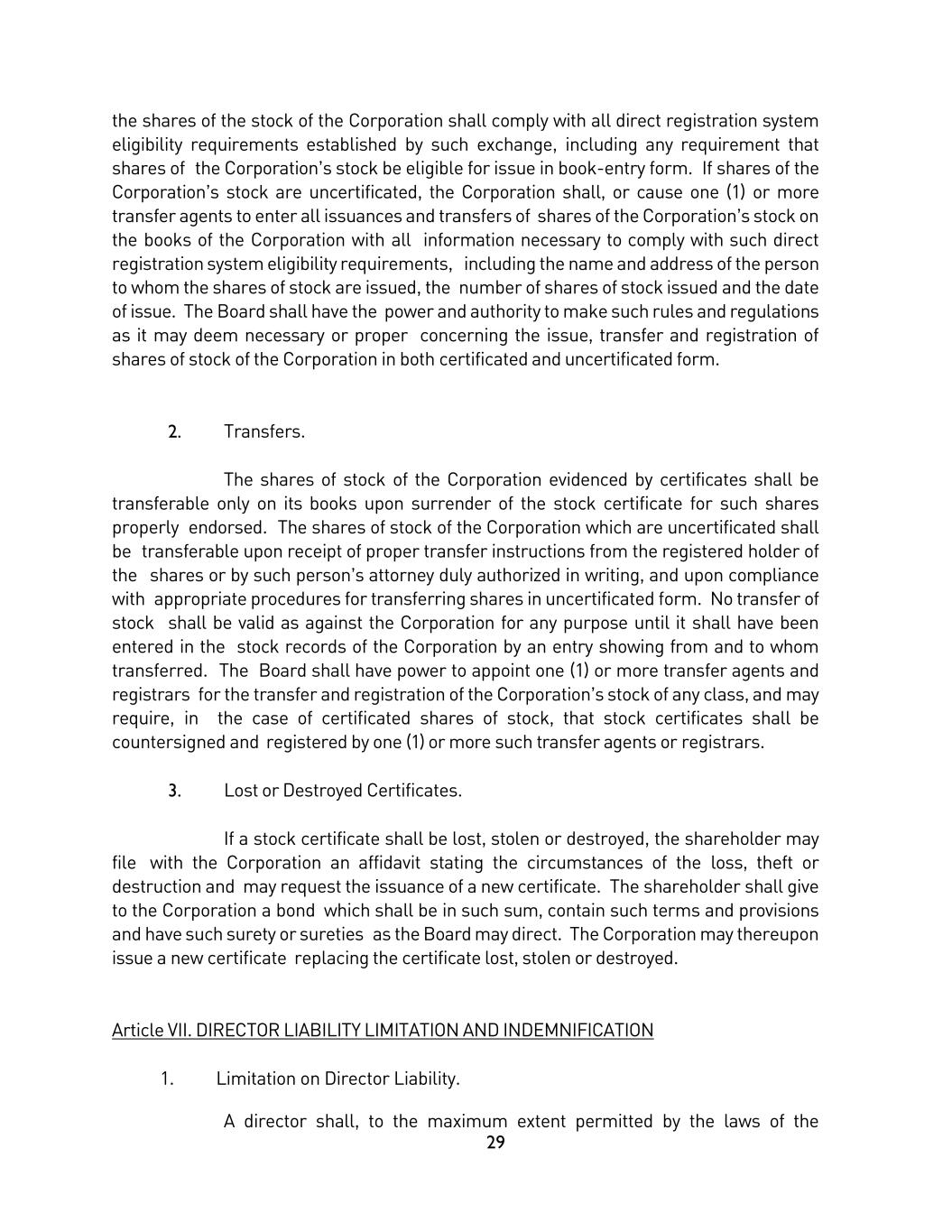
29 the shares of the stock of the Corporation shall comply with all direct registration system eligibility requirements established by such exchange, including any requirement that shares of the Corporation’s stock be eligible for issue in book-entry form. If shares of the Corporation’s stock are uncertificated, the Corporation shall, or cause one (1) or more transfer agents to enter all issuances and transfers of shares of the Corporation’s stock on the books of the Corporation with all information necessary to comply with such direct registration system eligibility requirements, including the name and address of the person to whom the shares of stock are issued, the number of shares of stock issued and the date of issue. The Board shall have the power and authority to make such rules and regulations as it may deem necessary or proper concerning the issue, transfer and registration of shares of stock of the Corporation in both certificated and uncertificated form. 2. Transfers. The shares of stock of the Corporation evidenced by certificates shall be transferable only on its books upon surrender of the stock certificate for such shares properly endorsed. The shares of stock of the Corporation which are uncertificated shall be transferable upon receipt of proper transfer instructions from the registered holder of the shares or by such person’s attorney duly authorized in writing, and upon compliance with appropriate procedures for transferring shares in uncertificated form. No transfer of stock shall be valid as against the Corporation for any purpose until it shall have been entered in the stock records of the Corporation by an entry showing from and to whom transferred. The Board shall have power to appoint one (1) or more transfer agents and registrars for the transfer and registration of the Corporation’s stock of any class, and may require, in the case of certificated shares of stock, that stock certificates shall be countersigned and registered by one (1) or more such transfer agents or registrars. 3. Lost or Destroyed Certificates. If a stock certificate shall be lost, stolen or destroyed, the shareholder may file with the Corporation an affidavit stating the circumstances of the loss, theft or destruction and may request the issuance of a new certificate. The shareholder shall give to the Corporation a bond which shall be in such sum, contain such terms and provisions and have such surety or sureties as the Board may direct. The Corporation may thereupon issue a new certificate replacing the certificate lost, stolen or destroyed. Article VII. DIRECTOR LIABILITY LIMITATION AND INDEMNIFICATION 1. Limitation on Director Liability. A director shall, to the maximum extent permitted by the laws of the
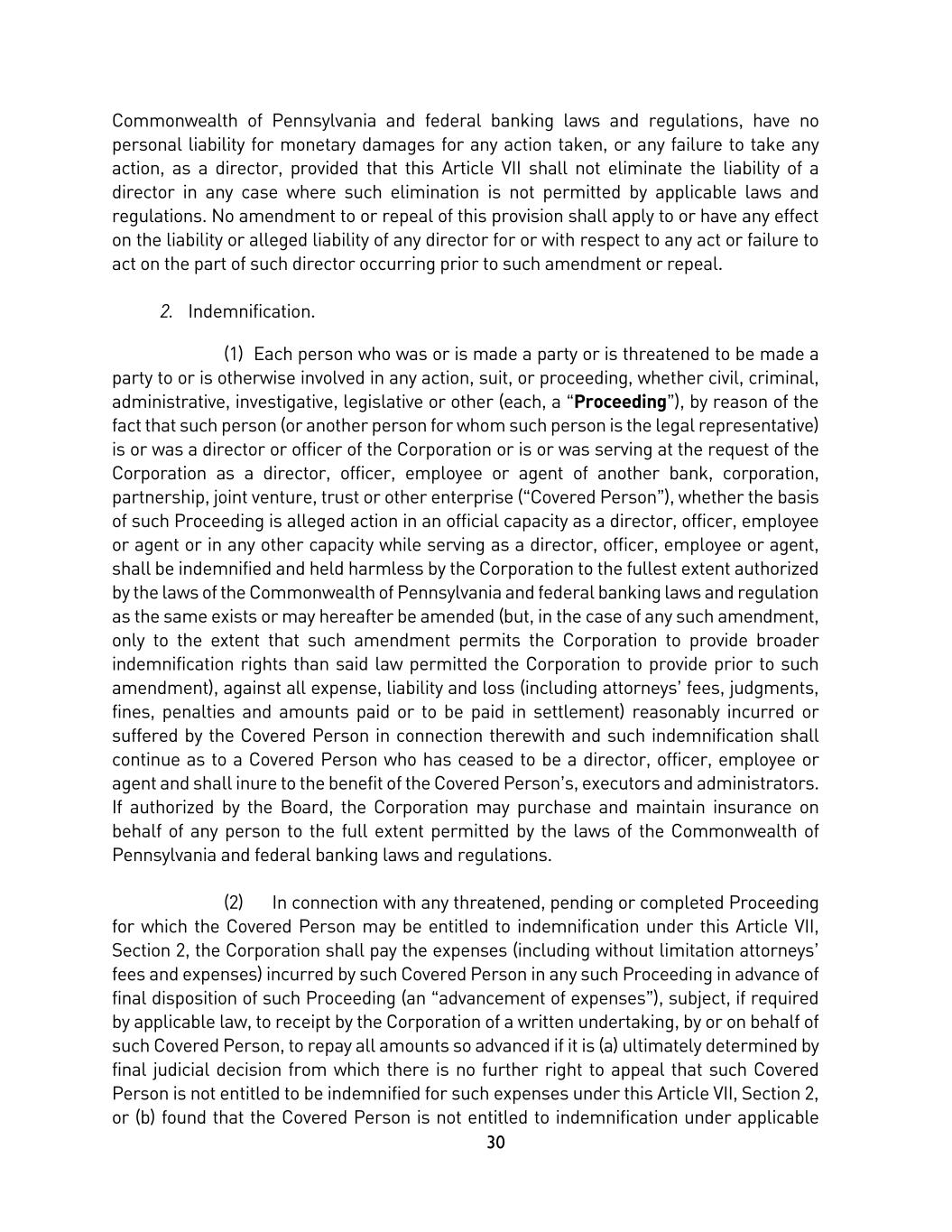
30 Commonwealth of Pennsylvania and federal banking laws and regulations, have no personal liability for monetary damages for any action taken, or any failure to take any action, as a director, provided that this Article VII shall not eliminate the liability of a director in any case where such elimination is not permitted by applicable laws and regulations. No amendment to or repeal of this provision shall apply to or have any effect on the liability or alleged liability of any director for or with respect to any act or failure to act on the part of such director occurring prior to such amendment or repeal. 2. Indemnification. (1) Each person who was or is made a party or is threatened to be made a party to or is otherwise involved in any action, suit, or proceeding, whether civil, criminal, administrative, investigative, legislative or other (each, a “Proceeding”), by reason of the fact that such person (or another person for whom such person is the legal representative) is or was a director or officer of the Corporation or is or was serving at the request of the Corporation as a director, officer, employee or agent of another bank, corporation, partnership, joint venture, trust or other enterprise (“Covered Person”), whether the basis of such Proceeding is alleged action in an official capacity as a director, officer, employee or agent or in any other capacity while serving as a director, officer, employee or agent, shall be indemnified and held harmless by the Corporation to the fullest extent authorized by the laws of the Commonwealth of Pennsylvania and federal banking laws and regulation as the same exists or may hereafter be amended (but, in the case of any such amendment, only to the extent that such amendment permits the Corporation to provide broader indemnification rights than said law permitted the Corporation to provide prior to such amendment), against all expense, liability and loss (including attorneys’ fees, judgments, fines, penalties and amounts paid or to be paid in settlement) reasonably incurred or suffered by the Covered Person in connection therewith and such indemnification shall continue as to a Covered Person who has ceased to be a director, officer, employee or agent and shall inure to the benefit of the Covered Person’s, executors and administrators. If authorized by the Board, the Corporation may purchase and maintain insurance on behalf of any person to the full extent permitted by the laws of the Commonwealth of Pennsylvania and federal banking laws and regulations. (2) In connection with any threatened, pending or completed Proceeding for which the Covered Person may be entitled to indemnification under this Article VII, Section 2, the Corporation shall pay the expenses (including without limitation attorneys’ fees and expenses) incurred by such Covered Person in any such Proceeding in advance of final disposition of such Proceeding (an “advancement of expenses”), subject, if required by applicable law, to receipt by the Corporation of a written undertaking, by or on behalf of such Covered Person, to repay all amounts so advanced if it is (a) ultimately determined by final judicial decision from which there is no further right to appeal that such Covered Person is not entitled to be indemnified for such expenses under this Article VII, Section 2, or (b) found that the Covered Person is not entitled to indemnification under applicable
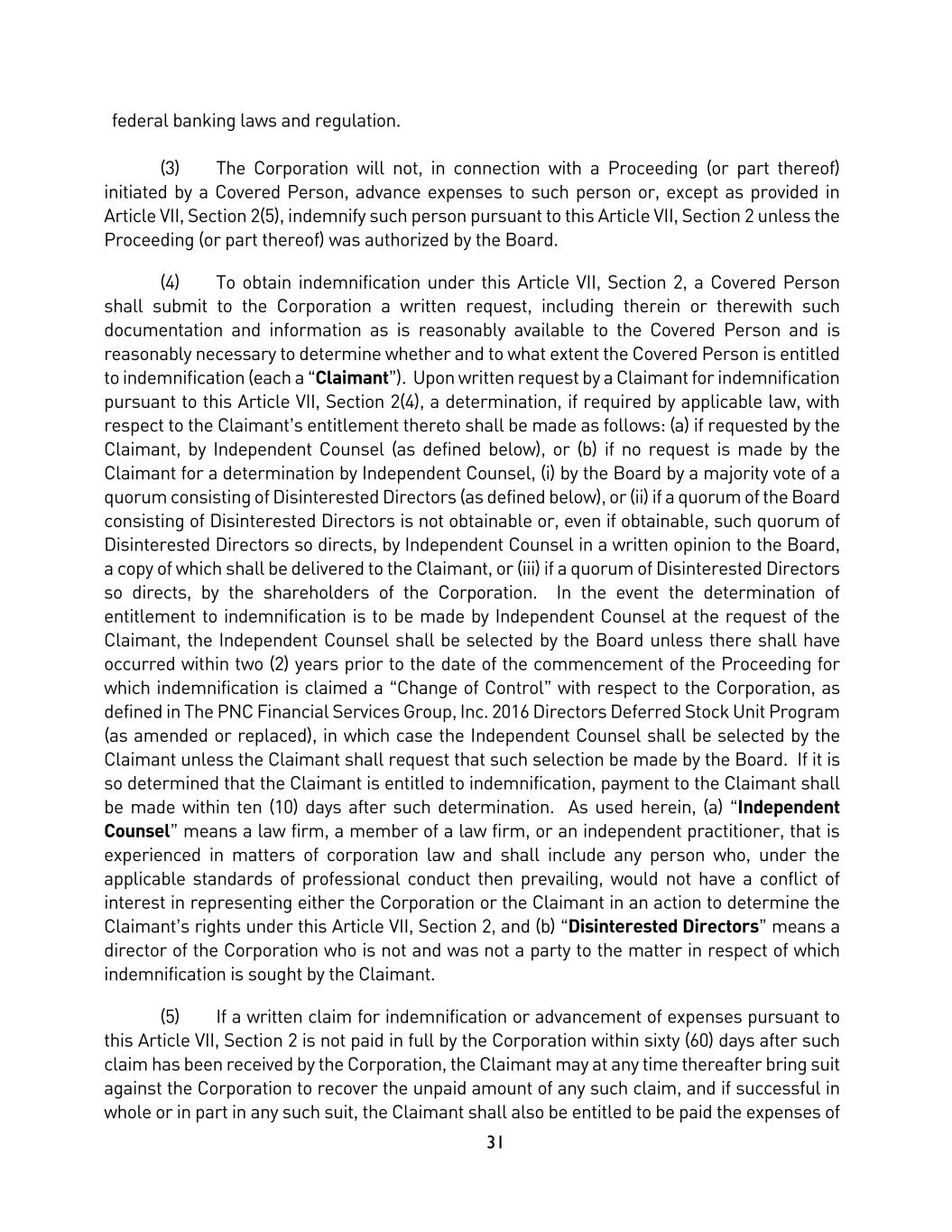
31 federal banking laws and regulation. (3) The Corporation will not, in connection with a Proceeding (or part thereof) initiated by a Covered Person, advance expenses to such person or, except as provided in Article VII, Section 2(5), indemnify such person pursuant to this Article VII, Section 2 unless the Proceeding (or part thereof) was authorized by the Board. (4) To obtain indemnification under this Article VII, Section 2, a Covered Person shall submit to the Corporation a written request, including therein or therewith such documentation and information as is reasonably available to the Covered Person and is reasonably necessary to determine whether and to what extent the Covered Person is entitled to indemnification (each a “Claimant”). Upon written request by a Claimant for indemnification pursuant to this Article VII, Section 2(4), a determination, if required by applicable law, with respect to the Claimant’s entitlement thereto shall be made as follows: (a) if requested by the Claimant, by Independent Counsel (as defined below), or (b) if no request is made by the Claimant for a determination by Independent Counsel, (i) by the Board by a majority vote of a quorum consisting of Disinterested Directors (as defined below), or (ii) if a quorum of the Board consisting of Disinterested Directors is not obtainable or, even if obtainable, such quorum of Disinterested Directors so directs, by Independent Counsel in a written opinion to the Board, a copy of which shall be delivered to the Claimant, or (iii) if a quorum of Disinterested Directors so directs, by the shareholders of the Corporation. In the event the determination of entitlement to indemnification is to be made by Independent Counsel at the request of the Claimant, the Independent Counsel shall be selected by the Board unless there shall have occurred within two (2) years prior to the date of the commencement of the Proceeding for which indemnification is claimed a “Change of Control” with respect to the Corporation, as defined in The PNC Financial Services Group, Inc. 2016 Directors Deferred Stock Unit Program (as amended or replaced), in which case the Independent Counsel shall be selected by the Claimant unless the Claimant shall request that such selection be made by the Board. If it is so determined that the Claimant is entitled to indemnification, payment to the Claimant shall be made within ten (10) days after such determination. As used herein, (a) “Independent Counsel” means a law firm, a member of a law firm, or an independent practitioner, that is experienced in matters of corporation law and shall include any person who, under the applicable standards of professional conduct then prevailing, would not have a conflict of interest in representing either the Corporation or the Claimant in an action to determine the Claimant’s rights under this Article VII, Section 2, and (b) “Disinterested Directors” means a director of the Corporation who is not and was not a party to the matter in respect of which indemnification is sought by the Claimant. (5) If a written claim for indemnification or advancement of expenses pursuant to this Article VII, Section 2 is not paid in full by the Corporation within sixty (60) days after such claim has been received by the Corporation, the Claimant may at any time thereafter bring suit against the Corporation to recover the unpaid amount of any such claim, and if successful in whole or in part in any such suit, the Claimant shall also be entitled to be paid the expenses of
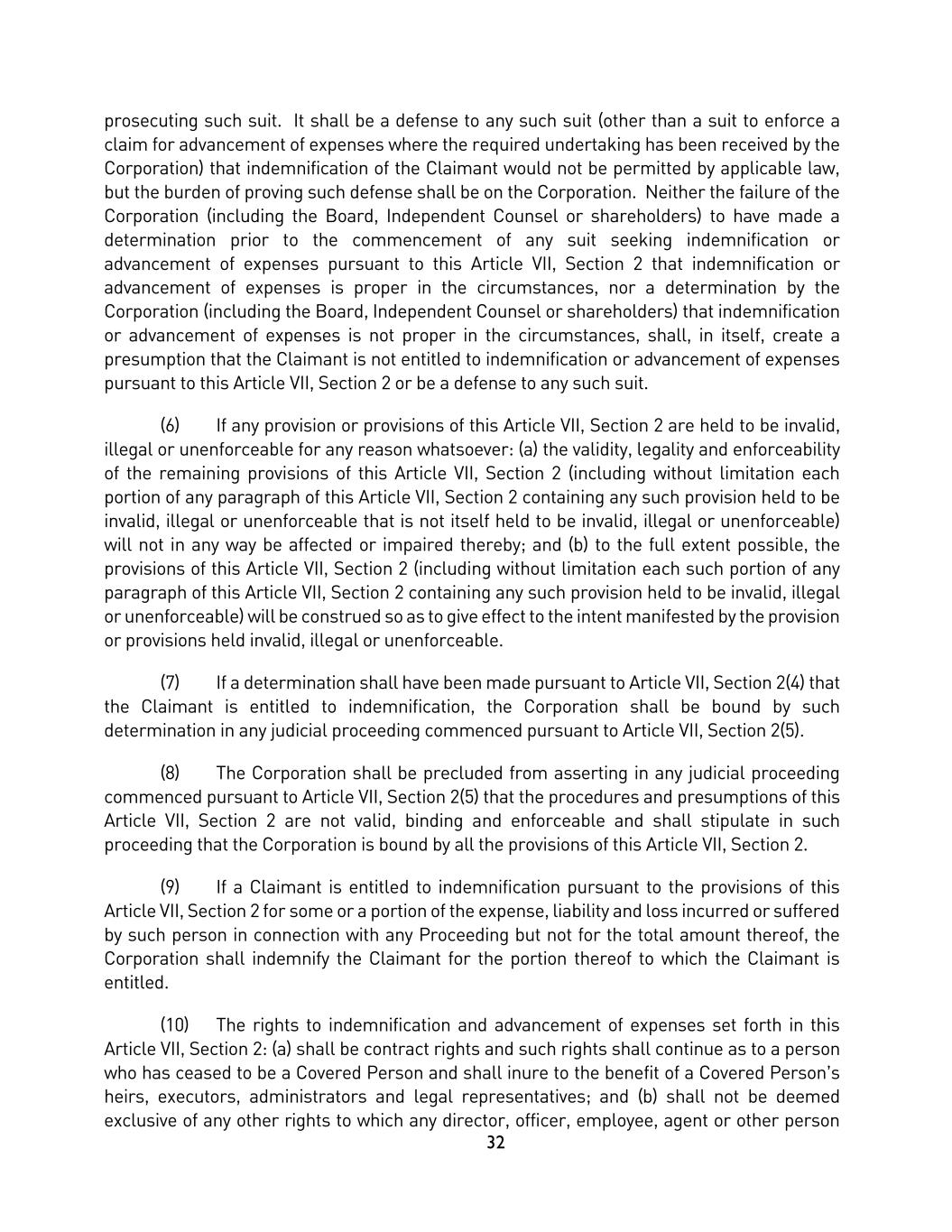
32 prosecuting such suit. It shall be a defense to any such suit (other than a suit to enforce a claim for advancement of expenses where the required undertaking has been received by the Corporation) that indemnification of the Claimant would not be permitted by applicable law, but the burden of proving such defense shall be on the Corporation. Neither the failure of the Corporation (including the Board, Independent Counsel or shareholders) to have made a determination prior to the commencement of any suit seeking indemnification or advancement of expenses pursuant to this Article VII, Section 2 that indemnification or advancement of expenses is proper in the circumstances, nor a determination by the Corporation (including the Board, Independent Counsel or shareholders) that indemnification or advancement of expenses is not proper in the circumstances, shall, in itself, create a presumption that the Claimant is not entitled to indemnification or advancement of expenses pursuant to this Article VII, Section 2 or be a defense to any such suit. (6) If any provision or provisions of this Article VII, Section 2 are held to be invalid, illegal or unenforceable for any reason whatsoever: (a) the validity, legality and enforceability of the remaining provisions of this Article VII, Section 2 (including without limitation each portion of any paragraph of this Article VII, Section 2 containing any such provision held to be invalid, illegal or unenforceable that is not itself held to be invalid, illegal or unenforceable) will not in any way be affected or impaired thereby; and (b) to the full extent possible, the provisions of this Article VII, Section 2 (including without limitation each such portion of any paragraph of this Article VII, Section 2 containing any such provision held to be invalid, illegal or unenforceable) will be construed so as to give effect to the intent manifested by the provision or provisions held invalid, illegal or unenforceable. (7) If a determination shall have been made pursuant to Article VII, Section 2(4) that the Claimant is entitled to indemnification, the Corporation shall be bound by such determination in any judicial proceeding commenced pursuant to Article VII, Section 2(5). (8) The Corporation shall be precluded from asserting in any judicial proceeding commenced pursuant to Article VII, Section 2(5) that the procedures and presumptions of this Article VII, Section 2 are not valid, binding and enforceable and shall stipulate in such proceeding that the Corporation is bound by all the provisions of this Article VII, Section 2. (9) If a Claimant is entitled to indemnification pursuant to the provisions of this Article VII, Section 2 for some or a portion of the expense, liability and loss incurred or suffered by such person in connection with any Proceeding but not for the total amount thereof, the Corporation shall indemnify the Claimant for the portion thereof to which the Claimant is entitled. (10) The rights to indemnification and advancement of expenses set forth in this Article VII, Section 2: (a) shall be contract rights and such rights shall continue as to a person who has ceased to be a Covered Person and shall inure to the benefit of a Covered Person’s heirs, executors, administrators and legal representatives; and (b) shall not be deemed exclusive of any other rights to which any director, officer, employee, agent or other person
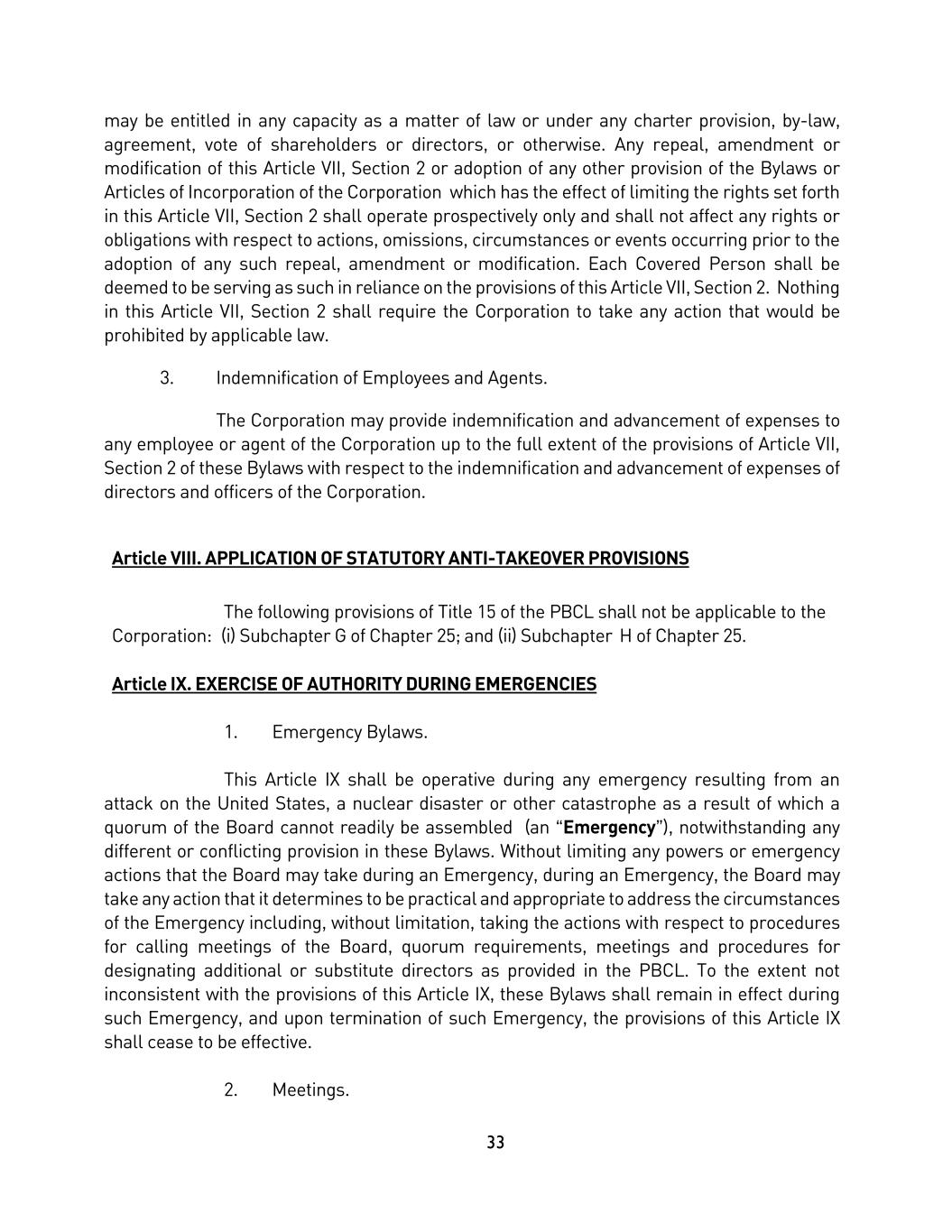
33 may be entitled in any capacity as a matter of law or under any charter provision, by-law, agreement, vote of shareholders or directors, or otherwise. Any repeal, amendment or modification of this Article VII, Section 2 or adoption of any other provision of the Bylaws or Articles of Incorporation of the Corporation which has the effect of limiting the rights set forth in this Article VII, Section 2 shall operate prospectively only and shall not affect any rights or obligations with respect to actions, omissions, circumstances or events occurring prior to the adoption of any such repeal, amendment or modification. Each Covered Person shall be deemed to be serving as such in reliance on the provisions of this Article VII, Section 2. Nothing in this Article VII, Section 2 shall require the Corporation to take any action that would be prohibited by applicable law. 3. Indemnification of Employees and Agents. The Corporation may provide indemnification and advancement of expenses to any employee or agent of the Corporation up to the full extent of the provisions of Article VII, Section 2 of these Bylaws with respect to the indemnification and advancement of expenses of directors and officers of the Corporation. Article VIII. APPLICATION OF STATUTORY ANTI-TAKEOVER PROVISIONS The following provisions of Title 15 of the PBCL shall not be applicable to the Corporation: (i) Subchapter G of Chapter 25; and (ii) Subchapter H of Chapter 25. Article IX. EXERCISE OF AUTHORITY DURING EMERGENCIES 1. Emergency Bylaws. This Article IX shall be operative during any emergency resulting from an attack on the United States, a nuclear disaster or other catastrophe as a result of which a quorum of the Board cannot readily be assembled (an “Emergency”), notwithstanding any different or conflicting provision in these Bylaws. Without limiting any powers or emergency actions that the Board may take during an Emergency, during an Emergency, the Board may take any action that it determines to be practical and appropriate to address the circumstances of the Emergency including, without limitation, taking the actions with respect to procedures for calling meetings of the Board, quorum requirements, meetings and procedures for designating additional or substitute directors as provided in the PBCL. To the extent not inconsistent with the provisions of this Article IX, these Bylaws shall remain in effect during such Emergency, and upon termination of such Emergency, the provisions of this Article IX shall cease to be effective. 2. Meetings.
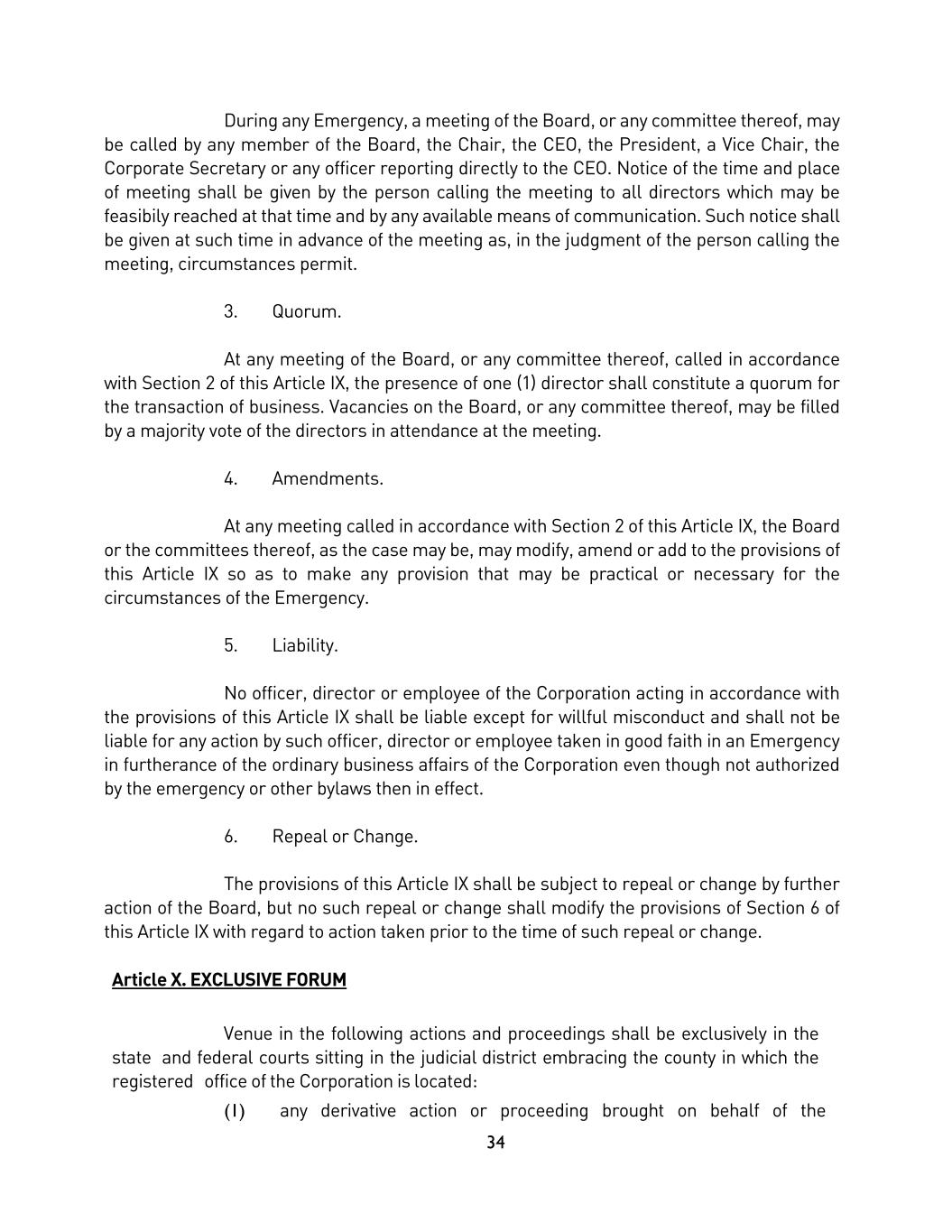
34 During any Emergency, a meeting of the Board, or any committee thereof, may be called by any member of the Board, the Chair, the CEO, the President, a Vice Chair, the Corporate Secretary or any officer reporting directly to the CEO. Notice of the time and place of meeting shall be given by the person calling the meeting to all directors which may be feasibily reached at that time and by any available means of communication. Such notice shall be given at such time in advance of the meeting as, in the judgment of the person calling the meeting, circumstances permit. 3. Quorum. At any meeting of the Board, or any committee thereof, called in accordance with Section 2 of this Article IX, the presence of one (1) director shall constitute a quorum for the transaction of business. Vacancies on the Board, or any committee thereof, may be filled by a majority vote of the directors in attendance at the meeting. 4. Amendments. At any meeting called in accordance with Section 2 of this Article IX, the Board or the committees thereof, as the case may be, may modify, amend or add to the provisions of this Article IX so as to make any provision that may be practical or necessary for the circumstances of the Emergency. 5. Liability. No officer, director or employee of the Corporation acting in accordance with the provisions of this Article IX shall be liable except for willful misconduct and shall not be liable for any action by such officer, director or employee taken in good faith in an Emergency in furtherance of the ordinary business affairs of the Corporation even though not authorized by the emergency or other bylaws then in effect. 6. Repeal or Change. The provisions of this Article IX shall be subject to repeal or change by further action of the Board, but no such repeal or change shall modify the provisions of Section 6 of this Article IX with regard to action taken prior to the time of such repeal or change. Article X. EXCLUSIVE FORUM Venue in the following actions and proceedings shall be exclusively in the state and federal courts sitting in the judicial district embracing the county in which the registered office of the Corporation is located: (1) any derivative action or proceeding brought on behalf of the
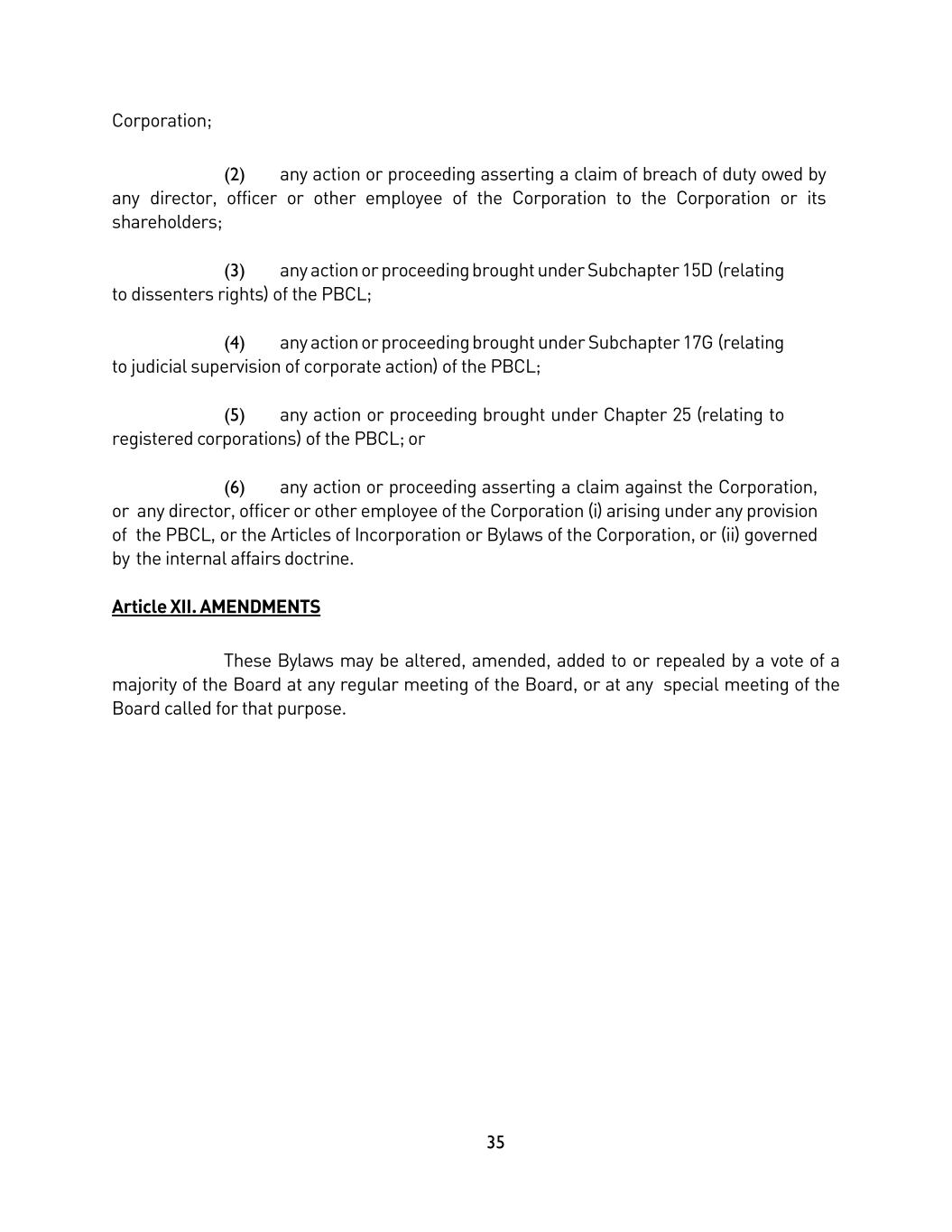
35 Corporation; (2) any action or proceeding asserting a claim of breach of duty owed by any director, officer or other employee of the Corporation to the Corporation or its shareholders; (3) any action or proceeding brought under Subchapter 15D (relating to dissenters rights) of the PBCL; (4) any action or proceeding brought under Subchapter 17G (relating to judicial supervision of corporate action) of the PBCL; (5) any action or proceeding brought under Chapter 25 (relating to registered corporations) of the PBCL; or (6) any action or proceeding asserting a claim against the Corporation, or any director, officer or other employee of the Corporation (i) arising under any provision of the PBCL, or the Articles of Incorporation or Bylaws of the Corporation, or (ii) governed by the internal affairs doctrine. Article XII. AMENDMENTS These Bylaws may be altered, amended, added to or repealed by a vote of a majority of the Board at any regular meeting of the Board, or at any special meeting of the Board called for that purpose.